#maybe its the false heteronormativity image
Text
i cannot explain to you WHY, but bunny and marion are absolutely a butch/femme lesbian couple, no other energy.
#maybe its the false heteronormativity image#i dont fucking know#but bunny corcoran has the vibes of the most rabid golden retreiver lesbian#meanwhile marion's insane unstable and dresses like a tradfem#absolute girlbossery of them both#once again..... if miss bunny corcoran isnt a lesbian im not linia barnbridges
4 notes
·
View notes
Text
A Word for Zoomers Who're Told They're "Making Up" Genders and Orientations.
I'm an Xer.
Well, actually I'm in that b.1977-85 throe where no two people can agree what I am. I'm Post Dankai Junior in the old country, but I was too old to be a kid for Pokémon, Harry Potter, I caught Digimon 02 during its premiere US run a rare Saturday the firm I worked at, that normally had Saturday hours, was closed. I met Windows Millennium Edition because a housemate, as back then, I'd realised I wanted to live with company, wanted to upgrade our computer to the newest version of Windows (and I promptly made AMVs using GIFs and lost them to the sands of time all before YouTube even existed) So that gives you an idea of my age.
I came out for the first time in high school. I came out as bi.
In Japan, transness, like here had different words we no longer use, but unlike here, wasn't a secret.
If I'd stayed in Japan just one more year, in '95 politician Kamikawa Aya began advocating on NHK for trans rights.
Maybe I'd've learned that transition *to* male and actual medical treatment like HRT to make that possible existed a whole lot sooner.
But I didn't. And so, I didn't realise it was actually something I could *do* and I wasn't doomed to be stuck until about 2010.
I claimed "bi" in the '90s, and mistook "you're a really cool person and really nice to me when few people are and so I really like you in a platonic sense" +aesthetic attraction for crushes of a romantic and sexual nature.
The SAM model was developed by bi people in the '70s, but where and when I was, there weren't exactly highly visible LGBT centres where I could learn this. So I thought any orientation had to be "x-sexual"
And I only knew about straight, gay/lesbian, and bi.
Which, the term "laaaaaaaabelllls" was coined by biphobic people my age. See, we weren't like people today, who literally can't live because of unfettered crony capitalism. You could get a nice studio on the nice side of town for eight days' work at minimum wage (of course, being POC, you had to find the right realtor), which back then was under four dollars an hour. You could get a 2br/1.5ba rowhouse for about two weeks' worth, which is half a month, but these days, that much work will get you a barely-studio in shoot-you-in-the-face-in-broad-daylight territory.
But we were still plenty suspicious of marketing. So queerphobic Xers went "don't make me acknowledge your filthy non-mono sexuality! What if I told you naming what you are is dehumanising, like labelling a jar of mayo, and you're the product!"
Which is no different that queerphobic Millennials claiming "Queer is a slur uwu call it gay because cisgay and cishet are the only valid IDs uwu Gay has never ever been used as a pejorative uwu"
Which is also bunk because back in the '90s, if one young man did ANYTHING another didn't like, the other one could call it and him "gaaayyy" and that would be a homophobic attack via toxic masculinity on the first young man. Heck, I don't listen to much grunge, though I did at the time, but it's used this way in some Nirvana song. I just can't remember which one.
Anyway, so I claimed bi and spent the next 23 or so years fighting for it even against physical violence to make me claim something in the false straight/gay binary
All along, I thought "the mushy stuff squicks me because I'm a guy (insert ways I justified things before I realised that yes, I actually am male for prior to 2010)" which, yeah, I'm still sorting through the myriad manifestations of toxic masculinity and learning to spot them. What that actually is is romance repulsion.
I'm actually aroace.
To go further, I actually have very strong platonic affection feelings, and "idemromantic" is not necessarily my actual identity, but that, and at least some idea, if even wrong, that the other party was interested, was how I sorted whether I should approach the other person as "friend" or "potential partner" subconsciously.
Plus to further complicate things, I'm sex-favourable ace/cupiosexual, which meant that just hearing limited definitions of things like sex repulsion in aces didn't clue me in. It wasn't until discussing what sexual attraction was with a newly-realised gay first wave Xer last year that I realised I had no idea what that was and had never felt it, and was therefore asexual. Which after the discussion with that guy, I dove into readings by you all on Tumbler first.
And I only realised I'm aromantic last month, though I've been questioning for actually a year this month.
Now, I'd say my aesthetic attraction is definitely bi, and yes, I accept the redefinition made with the info we have now of two or more genders including your own" which *I read* as "but not necessarily all genders, and perceived gender is a factor" whereas pan seems to me like "perceived gender is not a factor in attraction" ??
Now, I still actually don't have an idea about my potential aesthetic feelings towards people who present NB. The men and women I feel it towards tend to have this or that decidedly masculine or feminine traits, and I may never, because people my age are less likely to come out.
Whether orientation or gender, people my age are products of a very binary 20th century. We were really all sorts of shape pegs, but many of us were and still are dodecahedrons and whatnot with choices of only square, circle, and mayyybe triangle holes.
Naturally, the dodecahedrons and the hexagons all tried to jam themselves in circle and square holes, whichever ones it looked like we could maybe wedge into.
This means plenty of us are going around thinking things like "I guess I don't like sex because I'm a woman" or "I guess I don't like the mushy stuff because I'm a man" or "I don't feel female so I guess I'm a man because I'm AMAB and that's all I got" etc.
Those most likely to come out are those with very strong NB/aro/ace feelings WHO BECOME INFORMED. And some may still not, or those with feelings they can't sort, because they've lived so long the previous way, they may at least feel they have too much to lose.
There's also people like me that need a lot of info to realise they were misreading their own feelings due to decades of amatonormative/heteronormative/binarist/toxic masculine brainwashing.
(I still don't like the term "toxic masculine" because I really want a term where we have more room to redefine "masculine" as decidedly masculine but wholly without the toxic stuff that's so married to "manliness," room to reject that stuff and revision manliness, but whatever)
THE REASON OLDER GENERATIONS DON'T HAVE THIS STUFF IS NOT BECAUSE YOU'RE INVENTING IT. IT IS BECAUSE OUR TIME DIDN'T ACKNOWLEDGE IT.
Yes, I think it's funny imaging how lost you'd be trying to use an 8-track player, or a library card catalogue actually made of index cards.
And had I not miscarried in December 2003 and had a sixteen year old, I'd have had them set up the internet TV device I got instead of three hours barely restraining myself from breaking it into pieces just like I was the only one who was able to figure out how to set the VCR clock and VCR+ timers when we got one when I was young. Which my difficulty with this stuff is more like a Boomer than an Xer. Most of my peers are pretty savvy. Sometimes my friends can tele-help me.
And I think new music,which I define as post-Y2K, stinks.
So I'm not hip and new. Plenty about me is just like your parents.
But no, you aren't making this up. And you're informing a lot of us. You're waking us up to how truly diverse humanity is. You're waking some of us up to who we really are.
And as for those of you who have crummy and even Karen parents, two things:
A. The Latino kids took me and the other Asian in in high school. There aren't many Asians in FL. (The "Another Chinese Family" bit on Fresh Off The Boat is so real) There are definitely some crummy Xers out there, and that's been true all along. There was even a right-wing youth org called "young republicans." There were Regean-loving racist queerphobes all along. They made my life miserable in high school, too.
B. There are also others like me that believe in you. That actually need you. You're bringing *back* a diversity that was smothered by colonial Europe. Historical precedent is actually on your side.
Thank you. I mean it. You're doing good, you're legit, and there are a lot of us who believe in you, too.
#nonbinary#gen z#aromanticism#asexuality#queer#gen x#xennial#the name for people in that weird throe the Boomer/X debated throe is Gen Jones they both have names#intergenerational stuff#diversity#long post#i said a word but more like a thesis www
9 notes
·
View notes
Text
False God, Kaylor's New Anthem
False God - the sexiest part of the album, Lover, (similar to the flirtatious Dress in Reputation) to me personally, has a intriguing meaning. I have searched the web to see what analyses so far regarding the lyrics. Nothing much, mostly saying that it is about Joe Alwyn. Okay, let's debunk this one. 'Cause I also know that Kaylors have an interpretation from the gay's angle.
I think, I can speak on both perspectives, since I've been in both. I once married, however my biggest love life relationship was with woman. So, I am really curious to know, in what angle did Taylor actually write this song.
***
We were crazy to think. Crazy to think that "this" could work -> okay, since almost everyone out there agree that FG about love/relationship, so "this" referring to Taylor relationship (lover).
Now, don't you think it kinda strange that Taylor having a doubt about her relationship with Joe? I mean, she was 27th when she first met Joe & with enough experiences in relationship already, not to mention Joe is also coming from almost the same background, apart from different country and Joe gained celebrity status from the cinematic industry, but still I mean, what is so crazy about starting a "heteronormative" relationship like that?
Unless... she was talking about a "different kind" of relationship - something, which in general, still being perceived as 'abnormal'...
Hmmm, interesting.
But wait, there's another way to translate it, that somehow during that moment she was having an existential crisis. She questioned a lot of thing: the meaning of being celebrity i.e. she worked so hard to pursue her dream whilst at the same time she was devastated by the facts that people whom she thought once friends, stabbed her from the back - or that strangers would start to belittle & mocking her for everything - she had trust issue, she started losing confidence, she hold grudge, she was in emotional turbulance (these loosely translation based on her interviews).
Hence: she thought to drag someone to her "crazy" world would be tenacious.
Remember how I said I'd die for you? --> seems like she was really madly in love here
We were stupid to jump --> yet they've decided to taste the water anyhow
In the ocean separating us. Remember how I'd fly to you?
--> ok, again, this does fit Joe. Cause taking it in literal sense, then it probably about her had to fly back n forth US-UK.
However, Karlie still fits the role as well, I think, since they both doing a busy life, mostly continental apart.
Whoever it was for, metaphorically speaking it is about how she was making a sacrifice for the relationship to work.
And I can't talk to you when you're like this
--> later we would comprehend that Taylor was talking about a moment when her and lover had some feud. When she restrospected how during the couple-fight, her beau would:
Staring out the window
(I imagine her beau stood still, in silence, gazed through the window) avoiding to look her in the face, thus she thought:
like I'm not your favorite town
!!! What is her beau fave town?
I'm New York City
(yeah, baby!) And whose fav city is New York? Karlie Kloss!
"Well, Joe can also regard NYC as his fave city..." True - but, Taylor wouldn't be writing something that has no common reference to it. I've googled Joe's city preference and came out with null results. While as for Karlie Kloss, almost everywhere - you can find her boasting around about how much she loves NYC. As a matter of fact - she was the one who convinced Taylor to move to NYC in 2014 (and Taylor has been in love to the city, since).
Furthermore the next lyrics kinda congruent to the above speculation:
I still do it for you, babe
--> "I moved to NYC still staying here to date because of you." See, it still a close referrence to Karlie.
Can you come out with different translation that lead to Joe, instead? If you do, please let me know in the comment.
They all warned us about times like this. They say the road gets hard and you get lost
--> this one is really interesting. We all know Joe and Taylor still together and that Taylor somehow bragging about how happy in relationship she is now. But here as if like her saying that 'something happened to the couple' in FG story. Something big and terrible - something that might cause them to split/break apart.
And she kinda blame, the reason why it happened cause:
When you're led by blind faith. Blind faith
--> what is the meaning of "blind faith" in term of falling in love? Yes, when you are so in love that you are willing to do anything to retain or to be in it. You disregard everything, cause you are so drunk inside the pool of love, lust, altogether. You become 'blind'.
Ok, let's speak in het point a view, first - do you think, you see a magical spark when seeing Joe with Taylor out and about? Hard to tell? Okay, fair enough.
But here, an excerpt from Rolling Stone interview:
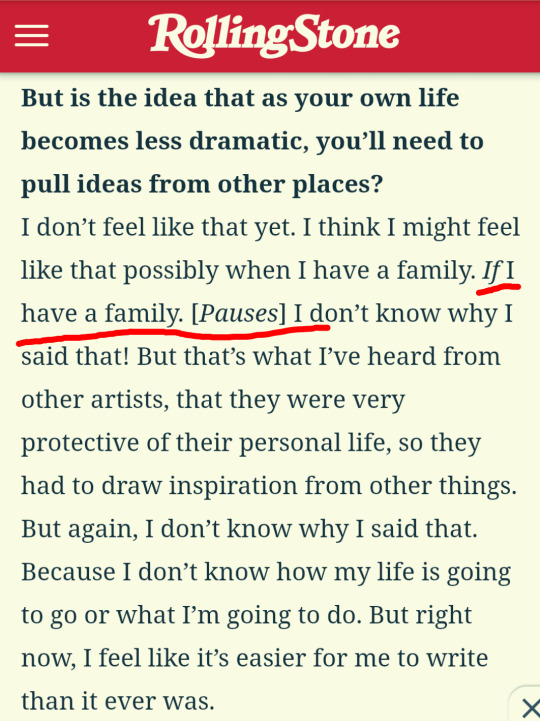
Her paused after accentuated the word "if"... to me is her showing hesitation even doubt to the idea of having a family.
Kinda weird coming from her current public image in Lover Era where she continue asserting how happy she is and how seems like, she has found the love of her life.
Further in FG she asserted that she is madly in love with someone whom she willing to die for - to fly across ocean for - so much intoxicated by love as if like having a blind faith!
Unless... the love of her life which she depicted in FG is...
in which because of that, for her to think of the ideas of: 'to be together, be a family'; would be a crazy notion and hard to imagine.
***
Yet, she also made it clear in FG, despite the odd, she was not ready to release the idea of 'stick together for good', because she thought there is still possibility that:
(But) we might just get away with it
***
The following lyrics to me, kinda raw and blatant:
Religion's in your lips. Even if it's a false god. We'd still worship.
(We might just get away with it)
The altar is my hips.
Lips & hips -> you imagine anything? (Lol).
Why False God? Clearly, she still talking about love:
Even if it's a false god. We'd still worship this love.
So in another word, Taylor using False God as a metaphor for passionate love she was experiencing with someone.
But why False God?
My take using gay perspective: is because we know how most religions condemn homosexuality. So with probably her involved in the same sex relationship, which would be considered sin or false by many, this probably her way of saying: "I don't care. I have all the rights to love whomever I want to love, regardless what society in heterenormative world would think!"
Next:
I know heaven's a thing. I go there when you touch me, honey. Hell is when I fight with you. But we can patch it up good. Make confessions and we're begging for forgiveness. Got the wine for you.
In general sense, the narrative here is about normal things happen in relationship. It's about having differences inside romance - a fight, a quarrel- then "kiss and make up".
But again, it is interesting how she chose the religious term like 'hell' and 'heaven' to equate her romantic endeavours.
This can't stop me from thinking that she actually is talking about sacred-secret love which against religious belief.
(Again, her way in saying: "I don't care your heaven or hell! I have my own, in this love-life story of mine!").
I would also like to re-iterate: "Got the wine for you" - seemingly her 'make up' sentence for her beau. But it is interesting to think about her chosen word "wine" there. It could mean literally that they both do love wine or...
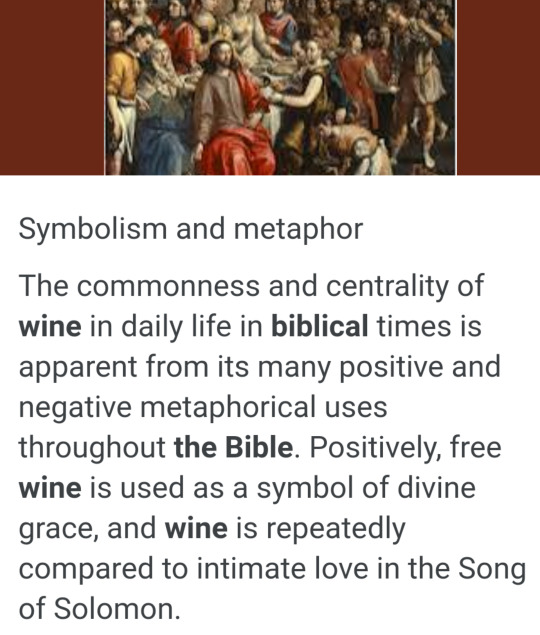
"intimate love" - ok very much correlated. Yet further from the same source (wiki), wine (alcohol in general) often perceived as "evil".
So in which way, Taylor denoted "wine"? If its in devilish way, yes, then it is another mockery from her to religious dogma as if like saying: "I don't mind being perceived as evil. Me and lover will continue doing what we are doing!"
And you can't talk to me when I'm like this. Daring you to leave me just so I can try and scare you.
Hehe, so woman, don't you think? ;)
You're the West Village. You still do it for me, babe.
A shout out to Kaylors on this. Cause west village in literal meaning is a place where Karlie once lived.
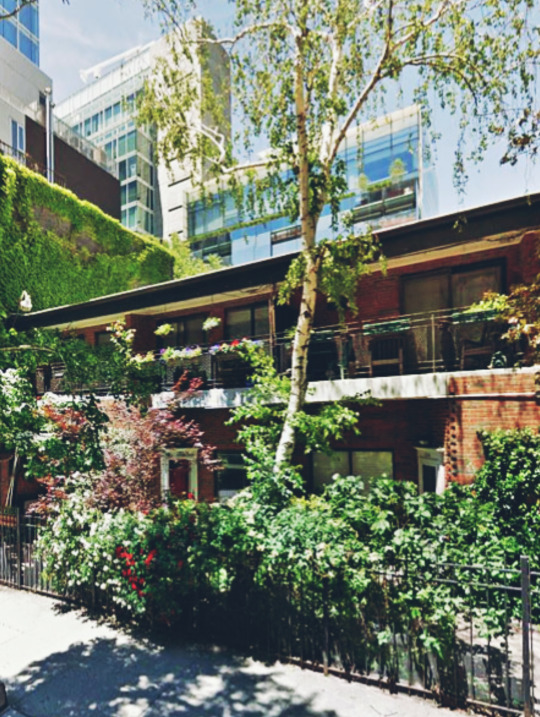
Is there any other meaning for West Village? Yes, a big maybe. But unfortunately, I couldn't find any. Perhaps, you can dig on that and tell me later?
Finally, when come back to:
They all warned us about times like this. They say the road gets hard and you get lost
--> if we persevere with Karlie's scenario - then one could imagine this depiction is perfectly suitable to the Kaylors conspiracy theory.
How we speculated that their relationship in trouble - they chose to beard for their career sake - beside continue "behind the scene" with their LOVE that worthy eternal worshipping.
Sounds too delusional?
Perhaps. But since it is still a blank space, one owns a prerogative to write things accordingly. And False God is a love letter from Taylor Swift to Karlie Kloss? I'd say ameen to that!
xxx
Update: Joe Alwyn Fave City (thank you @dodsdmr for this info)
#kaylors#kaylor#debunking kaylor#joe alwyn#karlie kloss#album lover#lover era#taylor swift#false god#taylor lyrics#false god meaning#false god lyrics analysis#taylor swift's song analysis#swifties
104 notes
·
View notes
Text
Madi Lou (and trans+ artists, too!)
Playing off the idea of "T4T" (trans seeking trans, typically associated with the terms found on the app Grindr) I wanted to compile a playlist of trans/nonbinary/gender non-conforming artists that are present in a variety of genres and gender expressions/presentations/labels.
https://open.spotify.com/playlist/52OZ896qRkAM2oqUwbtd5P?si=OQpd8kqSRnGGKcWe6XLcSw
"Maker - Acoustic” by Anjimile
Anjimile is a “queer and trans songmaker/lover boy with a heart of gold” based in Boston, MA
"Emasculate" by Dorian Electra
Dorian Electra is a gender-fluid pop musician who likes to become a “genderless clown” in their extravagant makeup and campy aesthetics.
"800 db cloud" by 100 gecs (Laura Les)
Laura Les, part of the duo 100 gecs, is a trans woman previously known under her project Osno1 (I felt it personally prevalent to include her song “How to Dress as Human” but could only find the link through Youtube)
"Heartbreaker" by Ah-Mer-Ah-Su
In her 2018 album STAR, Ah-Mer-Ah-Su wanted to tell the story of her black trans identity--a story typically connected to struggle and coping with extreme opposition from society at large. “For me, this album simply means that I’m a black girl with something to say. I have a story, and I’ll tell it through my music.” (billboard, August 2018)
"HRT" by Girls Rituals
Devi McCallion has worked in a number of projects centered under her label blacksquares. Her trans identity is touched on in such projects as Cats Millionaire/Mom, blackdresses, and Girls Rituals.
"Trans Femme Bonding" by Tami T
Originally starting her glittery electronica sound under the name Tami Tamaki, Tami T describes many aspects around the love for/between trans femmes // “So fucking brave, so fucking femme”
"Nonbinary" by Arca
Alejandra Ghersi, better known by her stagename Arca, came out as nonbinary and goes by she/her and it/its pronouns.
"Bitch Pudding" by KC Ortiz
Rising in the Chicago hip-hop scene, KC Ortiz wants to be known that she is no different than any other rapper. “I cringe when headlines say ‘Trans Rapper.’ That ain’t me...The only times that even crosses my mind really is when I think about because I’m trans I gotta be dope.” (Art Music Fashion Life, June 2020)
"Faceshopping" by SOPHIE
Sophie Xeon made her breakthrough in Oil of Every Pearl’s Un-Insides, becoming a known name after producing for artists like Charli XCX. She is very reclusive and has a smaller public image, contrary to her Louis Vuitton Spring/Summer 2020 appearance. (I have also discussed her imagery/lyricism of this song in 5th Avenue’s podcast--you should give it a listen to hear about other great queer artists!)
"Unkillable" by Katie Dey
“I was born inside this body and I’m stuck there/I’m a storm inside a rotting false construction” (Transition from “solipsisting” into “stuck” on Katie Dey’s debut album Asdfasdf)
"I'm Not 'Supposed' to Be Anything" by She/Her/hers
Emma Grrrl (and the occasional appearance of her friends) describes herself as sad grrrl pop-punk. “When I hear that a trans teenager shared one of my songs with their parents and it helped them to understand their experience, I just can’t imagine anything more validating or fulfilling than that.” (arena, June 2018)
"Gotta Gimme Your Love" by Sateen
Sateen is the band formally made up of the lesbian power couple Miss Sateen and Exquisite. Originally famous and sensationalized as a “hetero drag couple,” Exquisite came out as a trans woman and shifted the projection of their music and relationship into making disco for a new generation.
"TRANSylvania" by Kim Petras
Known famously on German television for medically transitioning in her teens, Kim Petras’ assertation in her identity as a trans woman gave her much of the internet presence and platform to successfully kick off a music career. “I hate the idea of using my identity as a tool...It made me the person I am and that’s a big part of me, but I think music is about your feelings and your fantasies and it goes deeper than your gender or your sexuality.” (billboard, 2018)
"Breakdown" by Torraine Futurum
Making waves in the fashion industry before walking in New York Fashion Week, Torraine Futurum says she aims to “do whatever the fuck I want to do on this Earth -- and it’s going to be excellent.” (them., 2018)
"I Am America" by Shea Diamond
“I knew at a very young age I loved to sing. My voice was effeminate and I remember feeling afraid to sing in the church choir...Desperate to find the financial means to transition to my true gender, I committed a crime in 1999 and was sentenced to 10 years in a men’s prison. I was afraid that I could possibly die in a prison system designed to ensure correctional jobs over human lives...I began writing ‘I Am Her’ as a statement to a world that said I shouldn’t exist.” (TEDxKC, 2018)
"Body and Soul" by teddy<3
Teddy Geiger has known many lives in popular culture from teen idol, romantic lead, to sought after producer. “I didn’t know anyone who was trans...I had very little connection to that, so it wasn’t really until maybe three years ago I started actually painting my nails and going out. Nobody cared if I was femme.” (Rolling Stone, 2018)
"Genderqueer Love Song" by Schmekel
“Schmekel means little penis is Yiddish, and is a play on the fact that all four members were born female but ow identify themselves on the masculine side of the gender spectrum. It’s an appropriate name for a band that started as a laugh.” (New York Times, 2011)
"Queer Kidz" by Ashby and the Occeanns
Ashlynn Barker is a trans/nonbinary musician based out of Chicago. They write songs about trans issues, queer identity, mental health, and video games.
"Cis Girls" by Dyke Drama
Sadie Switchblade of the band G.L.O.S.S. (Girls Living Outside Society’s Shit) came out with this “transparent” side project. “It’s pretty transparent...The songs are either about trans girl problems or dykey lesbionic friendships.” (Pitchfork, 2016)
"Femme Bitch Top" by Tribe 8
“When the trans-dyke neofeminist rabble-rousers known as Tribe 8 make music, not even heaven is safe.” (SF Gate, 2006) The San Francisco LGBT Film Festival entry “Rise Above” is a rock-documentary anomaly I highly recommend taking the time to watch.
"They / Them / Theirs" by Worriers
“You’ve got a word for one, So there’s a word for all. // The smallest things have become Which side are you on? // What if I don’t want something that applies to me? // What if there’s no better word than just not saying anything, anything?” The trio of gender-neutral pronouns
"Gender Nightmare" by Art Projects
“That’s not my face on the license picture // You call my name as it is on paper // As it will still be // When they write me up a eulopy” (Genius Lyrics analysis you want to click in on)
"Male Gynecology" by Shoplifting
A revival of riot-grrrl manifestas, the album Body Stories “brims over with precisely the kind of heartfelt, politically-charged fervor that’s far more likely to save rock. (Pop Matters, 2006)
"Third Gender" by Good Asian Drivers
“Sometimes my gender is chilling out inbetween, but most of the time my gender is FUCK YOU mind your own business!” → Please please please listen to the lyrics of this song, this is a wonderfully politically charged bop carried with heart and bass and punk spit.
"True Trans Soul Rebel" by Against Me!
Laura Les came out with her release of the album Transgender Dysphoria Blues and furthered this message in Against Me!’s album Shape Shift with Me. She was one of the first trans people I saw openly continue to pursue a passion despite previously having works “pre-transition” out in the world.
"If I Were You" by Claud
“Sometimes it’s more important to write from a perspective different from your own in order to touch on important things. People always tell me that I’m brutally honest and I think it’s because I don’t hold back on anything...it’s refreshing to hear something said that you want to say yourself, but just couldn’t.” (Popsugar., 2019)
"If You Knew This Was About You, You'd Deny It" by Wargo
A trans woman solo-acoustic based out of Virginia, Wargo’s sound is directly influenced by the punk scene of the east coast. She likes to call her style “Appalachian Power Pop.”
"I DONT TRUST U ANYMORE" by Left at London
Coming to a place of internet recognition through such vines as “hahaha I do that” Nat Puff’s indie pop project Left at Londed (shorted as /@/) dives into the heart of “what it means to navigate the current political world as a queer person, while still remaining accessible to the general public.” (“About” on /@/ website)
"Body Was Made" by Ezra Furman
“My body was made this particular way // There’s really nothing any old patrician can say // You social police can just get out of my face // My body was made” (Body Was Made music video is a quirky and fun stylistic retelling of these lyrics) Ezra Furman identifies as trans and bisexual and uses he/him and she/her pronouns.
"Complicated" by The Cliks
Lucas Silveira shared that the band’s name derived from two ideas; using The like iconic bands The Beatles and The Rolling Stones and Cliks as a portmanteau of the slang terms clit and dicks. (In The Life interview, 2009)
"Upper West Side" by King Princess
“Although [Mikaela Mullaney Straus] identifies as a genderqueer lesbian, King Princess doesn’t necessarily want her music to be placed in the ‘queer pop’ box.” (MTV, 2019) Who isn’t bored of the heteronormative narrative?
"Make Me Feel" by Janelle Monáe
“I consider myself to be a free-ass motherfucker. I want young girls, young boys, non-binary, gay, straight, queer, queer people who are having a hard time dealing with their sexuality, dealing with feeling ostracized or bullied for just being their unique selves, to know that I see you.” (NewNowNext, February 2020)
"body cast" by Dua Saleh
A Sudanese refugee, Dua Saleh nurtured their love for poetry in the beginnings of their Minneapolis music career. They came out as nonbinary while in their second year at Augsburg University but have said “I always been on gay shit.” (them., May 2020)
"Mercury" by CJ Run
“With a deep understanding of pop sensibility, and enough hooks to last a lifetime, CJ Run’s music is the inner monologue of a black queer 20 something in the 21st century.” (Propelr)
"Dancing With Stranger" by Sam Smith
“When I saw the word non-binary, genderqueer, and I read into it, and I heard these people speaking, I was like, ‘Fuck, that is me.’” (Vanity Fair, March 2019)
"SkindeepSkyhighHeartwide" by Lawrence Rothman
Lawrence Rothman is a gender fluid artist, musician, and producer. Looking into their Google Image results yields the visual evidence of the nine personas Rothman refers to as “alters, each one offering a different lens for their creative use.” (NPR, November 2018)
"Extended Vacation" by Ryan Cassata
Ryan Cassata is the first openly transgender musician to perform at Warped, winning the Ernie Ball Battle of The Bands contest twice (both in 2013 and 2015*). He has spoken out about American Idol attempting to exploit openly transgender people to pander to a broader audience banking on new forms of media “diversity”.
*I saw him in Mountain View, California in 2015 and you have no idea how happy a newly out genderqueer 16 year old was to stand on stage behind a proud trans man singing on a bumping stage.
"Let My Baby Stay" by Amandla Stenberg
This entire article is great in explaining why Amandla’s openness on their pronouns outside of this website might have harmed them for the future of their career.
"Dolla in My Titty (Part 1)" by Peppermint
Best known as the 2017 runner up on the ninth season of RuPaul’s Drag Race, Peppermint made her musical debut in Head Over Heels becoming Broadway’s first out trans woman to play a lead roll.
"Gender Bronoun" by Human Kitten
“What is unstable And what is real // This is a question that i ask myself on a daily basis // Are my emotions genuine Or are they just the result of my neural passages sending my chemicals back and forth” → “Caught i’m between two completely separate identites Who Can’t agree on anything // And i can’t even decide on which one’s me”
"Wow in the Now" by Honeybird
Honeybird is a musician and composer based in Bologna, Italy. Their mission is to listen to intersectional LGBTQ+ community voices and transform the daily struggle into songs.
"I Don't Love You Anymore" by ANHONI
“My closest friends and family use feminine pronouns for me. I have mot mandated the press do one thing or another...I think words are important. To call a person by their chosen gender is to honor their spirit, their life and contributions. ‘He’ is an invisible pronoun for me, it negates me.’” (Flavorwire, November 2014)
"Robert Frost" by Mal Blum
“Now I’m looking at the ground because I don’t want you to leave // I know it’s co-dependent But I think it’s kind of sweet // Out of every person in this city I could ever meet // Leaving feels like losing But I’m learning what I need”
"Dysphoria" by Saint Wellesley
“Binding my chest and biting my tongue Wearing boxers never fixed anyone” → “And this is the last time I’ll allow my ribs to be swollen // And I’ll grow out my hair And pretend I don’t care And maybe my ribs are broken” → “Dysphoria’s a bitch I wanna kick her in a ditch // It’s not fair to wanna itch All of the places that don’t fit”
7 notes
·
View notes
Text
So, here are my thoughts on this whole thing. (It’s long and a lil unorganized but it be like that sometimes lmao 🤷🏾♀️ also I’m on mobile so can’t figure out how to do the read more option for whatever reason =/)
To give some insight to all this, I started believing kaisoo was real on April 1st 2016, the day kxk was announced. I had only been officially stanning Ek sew since cmb but knew of them since overdose era. Ks and ji have consistently been my biases. I was here all throughout the kxk era and even predicted that they would soon break up in this post. So even though I’m a little bit taken aback and somewhat wasn’t expecting this, this ain’t my first rodeo.
Although in this situation I feel like this scandal is mainly being done to cover J*nnie (I also share this viewpoint with others such as @soofection and @kaisoounderground, correct me if I’m mistaken lol) what I think bothers me the most about how this is Ji’s second time in a dating scandal is the perceptions that people have of him regarding his persona and who he really is.
Keep in mind that what I’m about to say is my own perception of things, everyone has their own way of looking at shyt but at the end of the day I don’t personally know ji so I’m not claiming anything as fact. It’s all based on what I’ve observed about him throughout the years with him being my ultimate bias not just in kpop but like..in life lol. (There are other supporters who share the same idea, like @faakeid for example.)
——————-
I feel like since e——x—-o was created, the image of a “hot, sexy bad boy player” has always been pinned on ji. Out of all the members, he’s always the one front and center with him being the face of the group. He’s is usually the one in the most eccentric or revealing clothing (cue the crop tops and black hairstyles). He has a smoldering ‘come hither’ gaze and a smirk when he dances that will send you to your knees. He plays the bad guy or ladies man roll in almost every music video, and outside of the videos he’s wearing Gucci clothes strolling through the airport like it’s his runway. He’s hot. He knows it. You know it. I know it. So it would make sense, in a heteronormative world, that he would be a real ladies man.
But it’s weird, because outside of his stage persona, ji is different. He’s shy and awkward. He doesn’t really go out much, doesn’t drink, doesn’t have too many friends. He’s extremely observant and attentive to people and takes in all that is happening around him. He giggles a lot, sleeps a lot, reads a lot. He is weak for babies and dogs. He is super sentimental and insightful and wears his emotions right there on his sleeve. I’ve never seen him not accept a fan letter in an airport. He is an almost 6foot tall grown man that owns stuffed animals lmao.
I’m not saying his stage persona is not necessarily accurate, bits and pieces of that may be the side of him that is only able to be revealed through his art (I.e dancing/performing). But I feel like even though most fans acknowledge the ka*/ji duality, as soon as a scandal comes out about him everyone forgets it and suddenly he’s just the image he portrays.
Which brings me to this jxk scandal. Maybe it’s because he’s my bias and I’m just observant and keen on getting info about ppl I like, but once again everything mentioned in the dispatch statement doesn’t match the ji who isn’t his stage persona. Placing kaisoo aside for a moment, shyt like uploading matching insta posts, dating a celeb and getting caught for the second time just doesn’t seem like something ji would do. Though cute and soft, he’s not irresponsible and most importantly he’s not dumb. He’s walked through airports with face masks on to cover facial hair, but wouldn’t wear one for a date with a very famous celebrity under a dating ban after getting caught once before? It simply doesn’t make sense, but I feel like because people are so desperate for his k*i persona to be the real him, they ignore the real him and make it make sense. It doesn’t help that the company he works for consistently pushes this image of him as well.
Same with kxk back in 2016. The rumors people came up with were absolutely vile. Shyt like blowjobs in public pools and condom receipts (both debunked to be false btw) and literally everyone ate it up. Meanwhile I’m sitting here wondering....does anyone know who ji actually is?? Like seriously has anyone actually paid attention to who he is and how he behaves/interacts with people and carries himself? He couldn’t even say the word breast on tv but he’s getting blowjobs in public pools? I mean the shyt doesn’t even sound right lmao.
It also baffles me that people continue to believe dispatch year after year, even though they’ve been proven to have released false rumors and info. Again I think it’s because people want it to be true. They want it to fit their narrative and their image of ji which is largely again, most likely just his persona. They want to believe it’s true because its an “aesthetic couple” despite the fact that (unlike ba*ky*on) we heard not a peep from ji nor krys during kxk and every single part of dispatch’s story + rumors were proven false (and I’m sure the same thing will happen again now).
But it all makes sense in their heads bc in their heads, the hot sexy playboy ji on stage is really who they think he is. Someone like him could only be with another hot and sexy woman, which brings me to my second big issue about this: the ridiculous double standards with heteronormativity in Korea and in the industry/among fans. We all know that as soon as we give even a tiny hit that we think ji and is are dating, we’ll get called insane and delusional in a heartbeat. But how is it delusional to believe this? Because they’re both boys and in the same group? Do people not realize that something like this happened already?
If anything, I feel as though it would be easier to conceal your sexuality as a gay/non-straight male within kpop as an idol (let me reiterate easier to conceal, by no means am I implying that it would make living and/or identifying as lgbtq+ easier) than it would be as a normal every day person, and the reason for this is simply because no one ever willing to acknowledge the possibility that there are gay idols. Male idols would easily be able to do things that are generally thought of to be gay w/o an issue because everyone will write it off as skinship, aegyo, a company created ship or just being an idol. Kaisoo is a perfect example of this—even with years of rumors, ‘incriminating’ photos and very obvious demeanor everyone still is convinced they are both just friends. Ji and ks have had more matching outfits than ji has with any woman, but it’s only a sign of dating when it’s with a woman. Seh*n is another example, the boy straight up said he likes men at a concert and everyone forgot about it and went on about their day. On one hand, in a way this oblivious attitude helps to ironically keep them protected I suppose. But the flip side is that the heteronormativity of it stays exactly that—the norm.
I can’t really say for sure if this has anything to do with kaisoo this time (again I’m thinking it’s to protect Jn). I guess I’m just more annoyed that if this is indeed some sort of media play, once again it’s ji who has to succumb to the image he was given, one that clearly doesn’t seem to 100% match who he is.
#I hope i made myself clear enough with this one#I wrote this last night and had a bit of alcohol in me while i was writing it lol#so I wanted to wait and post it today when I had more clarity lmao 🤷🏾♀️🤷🏾♀️#anyhoo these are just my thoughts and observations#I feel like I made everything clear but if yall need clarifications on anything dont hesitate to shoot me an ask!#I dont want any misunderstandings💖#beri talks#kaisoo theory#maybe? lol#beri theories#kaisoo#kadi#dika
201 notes
·
View notes
Note
since discovering your blog i cant decide if you're delusional or really onto something
You know, I’m reading a book “Methology of Thinking”, and the author starts with a long explanation of the fact that each personal reality is a constructed false world. We live in a factual reality, but there is no means for humans to see the world for what it is (you don’t see in infrared and don’t feel radio waves and you don’t see a face exactly as it is in a given moment, but retrieve its image stored in your memory). So, in a sense, we are all delusional.
Ask yourself why, with all the facts layed out in this blog, you are still so hesitant to accept them. Maybe heteronormativity is the social construct you need to vanquish. Or maybe you need to educate yourself more about neuroscience and human behaviour.
I salut you for being open to different view on things though.
7 notes
·
View notes
Text
Everybody Cried
The movie Boys Don’t Cry is a film released in 1999 by director Kimberly Perice following Brandon Teena, a transgender male-to-female facing a “sexual identity crisis”. It follows him on his journey from his hometown, after his ex-girlfriend finds out his true biological sex, through to Falls City, Nebraska where he begins his new love affair with a girl named Lana Tisdel. However, he gets into more trouble than he could’ve ever imagined when his lies, his crimes, and, for the second time, his true sex all come out.
This film is based on the tragic true story of a transgender male by the same name as was commended for its being real and emotional without being edgy or betting on stereotypes. Brandon’s character is not particularly stereotypical and is complex. His character made this movie into a “breakout text” as it was one of the first films to represent male-to-female transgendered people in a real and believable way.

Image source:https://www.rogerebert.com/reviews/boys-dont-cry-1999
There is a huge part of the film that focuses on sexual violence and hate crimes against transgender people. As discussed in class, transgendered people, especially of color, face so much criminal and sexual violence. Transgender people are faced with “violence such as harassment, stalking, vandalism, and physical and sexual assault”(Office for Victims of Crime). The movie’s portrayal of rape and assault, followed by manipulation and, in the end, murder is exactly the fear amongst the transgender and queer communities. Brandon is raped and murdered by John Lotter, an ex-convict and Lana’s friend, who murder’s Brandon because he is a “dyke” and reported the rape. While the scene’s are raw and sometimes uncomfortable, it is a reality that plagues the trans community with fear. However, like every movie, it is not perfect and Boys Don’t Cry in particular has strong critics that believe the representation in the film has its downfalls.
Hilary Swank who plays Brandon Teena is a cis female playing a transgender man and many critics disagree with the casting choice. Regardless of her performance in the role, many people believe that Brandon should have been played by a transgender man and fight back against the choice to cast Swank. Because Hilary is not a trans man, she naturally casts heteronormativity on Brandon’s role, preventing a real transgender man from representing the character. There was even a protest regarding Swank’s role in the movie (Dry, Jude). Though this is not Hilary’s fault, many still argue her casting was not the right choice. This roots back to the discourse of “best actor” as discussed in class from Dr. Martin’s piece The Queer Business of Casting Gay Characters on U.S. Television, where directors justify not hiring minorities for roles they represent in favor of a better actor who is almost always does not identify with the minority role they are playing. However, I don’t think this is a case of best actor. 1999, when the movie was released, was a different time than today and Hilary Swank was taking a risk taking the role at all. Her performance in the role does not glorify what trans people go through nor does her playing the role invite any discrimination to others who may have tried for Brandon’s role.

Image source: http://www.dvdexotica.com/2015/06/the-european-cut-of-boys-dont-cry-is.html
I have also noted that Boys Don’t Cry focuses on a completely white cast. This could be potentially problematic as white becomes the only representation in the movie. There are no people of color throughout the movie or, at least, no people of color as main characters. Some argue that this is because the movie takes place in Nebraska and that the state does not have a large racial diversity to begin with. Others argue that including other races in the story where they were not present would be creating false representation and muddy the biographical qualities of the story instead. Counter-arguments state that the movie could’ve at least included some racial diversity amongst the background characters as it wouldn’t have taken away from the biographical integrity of changing the main characters races for the sake of equal representation. I do agree with the argument that there could have been some more racial diversity in the Nebraskan setting but I think casting a black character for the main roles could have proven dangerous for more social discourse. None of the characters in the film are particularly “good” people, maybe with the exception of Lana in the end. If a black actor had been cast as John or Tom Nissen, his friend and a colluder in Brandon’s murder, it could because a misunderstanding as to representing people or color as being associated with crime or as murderers. If a person of color was cast as Lana’s mother or her friends it could be misinterpreted as a social commentary on people of color being drunks or druggies. There are many ways casting could miscontrew the message but I don’t believe it is right to turn a movie focusing on trans issues into a movie half-tackling and half-creating race issues in addition to tackling trans issues.

Image source: http://ravepad.com/page/boys-dont-cry/images/view/1302188/Download-wallpaper-Boys-Do-not-Cry-Boys-Don-t-Cry-film-movies-fr
Overall, I agree that the movie has its flaws as all films do. Some of the criticism lies in the right place and some, I believe, is left to unreasonable expectations or overanalyzations. People and critics of today need to understand that the film comes from a different time, almost two decades from today and, at the time, this film was nothing short of taboo. From its open and believable representation of trans people and the violence and prejudice they still face today, Boys Don’t Cry is a breakout film for a reason. It’s telling of Brandon Teena’s story did something many films were afraid to do: starting a conversation about transgender people as people and not objects or the mentally deranged. This is why I believe Boys Don’t Cry is a great breakout text for it’s time, critics and all, and should be used to further the representation of the transgender community of today through the representation the community had in the past.
References:
Dry, J. (2016, December 14). 'Boys Don't Cry' Protests: Why We Should Listen to Trans Activists Criticizing The Milestone Film - Editorial. Retrieved from https://www.indiewire.com/2016/12/kimberly-peirce-boys-dont-cry-reed-transgender-1201757549/
Martin, A. L. (2018). The Queer Business of Casting Gay Characters on U.S. Television. Communication, Culture and Critique, 11(2), 282-297. doi:10.1093/ccc/tcy005
Peirce, K. (Director). (1999). Boys Don't Cry [Video file]. United States: Fox Searchlight Pictures.
Office for Victims of Crime (OVC). (n.d.). Retrieved from https://www.ovc.gov/pubs/forge/sexual_numbers.html
19 notes
·
View notes
Photo

Today’s first guest post is by my friend and fellow The Singles Jukebox contributor Vikram Joseph.
Counting to 15, 20, 30… - Delayed Queer Adolescence and the Songs of Troye Sivan
- Vikram Joseph
On a humid early August evening a few weeks ago, in one of those converted warehouse bars endemic to inner north-east London, I was chatting over drinks with a guy I’d once dated and had last seen in 2014. There was a lot to catch up on, and the conversation ran unexpectedly, rewardingly deep. It became clear that, though we’re both well into our adult lives by any conventional measurement, we’d each changed and grown significantly in the intervening years in a way that films, books and the media seem to suggest happens in your late teens. The idea of delayed adolescence being a common trope for queer people came up, and I’ve been thinking about it a lot since then. Why do those formative years of growth and the exploration of self-identity seem to happen later for us? Is it a delayed phase of development, a prolonged phase, or both? And how is this reflected in the way we interact, the spaces we choose to spend time in, and the art we consume?
***
A recent viral tweet:
“Gay culture is your life being delayed by 10 years because you didn’t start being yourself until your mid-20s.”
At the time of writing, this tweet has 117,000 likes. Clearly, this is a phenomenon which touches nerves across the spectrum.
To the extent that we can “know” a pop singer through their songs, it seems like Troye Sivan – still just 23, and releasing his second album – has done his growing fairly early on. In just a few years, we’ve heard him go from singing about tentative gay crushes to the fully-realised queer euphoria of his newer songs. And yet, the concept of protracted, stuttering adolescence is crisply, poignantly refracted through his music, and I feel that a lot of his immense appeal to queer people far older than himself can be attributed to this.
***
HEAVEN
“The truth runs wild, like kids on concrete.”
“Heaven” deals with the internal struggle for self-acceptance – by no means unique to LGBTQ+ people, but one that everyone who’s grown up on that spectrum will understand intimately, in the form of coming out to yourself. “Without losing a piece of me, how do I get to heaven?” Religion is a useful allegory here, but ultimately a distractor – the duality Sivan is really concerned with here is about happiness. For a lot of us, coming out for the first time feels like a crossroads, where we have to make a choice between one kind of happiness and another, and “Heaven” captures this (false, but very powerful) dichotomy beautifully.
Sivan’s first album, Blue Neighbourhood, hangs heavy with the imagery of suburbia. It’s rich, relatable visual and psychological territory, exemplified in decades’ worth of teen TV dramas and coming-of-age films. Many of us will recognise it as the backdrop to the fraught intensity of that long, tangled conversation with ourselves; the feeling of being on the brink of everything and the precipice of nothing, the intoxicating, paralysing combination of anticipation and dread. Sivan deals with this at 15; for me, I was 20, during university Christmas holidays, back in the dull hum of suburbia. Maybe there’s something about it that gives us the emotional space to plumb the depths of those brave new ideas. “Heaven” conjures this musically as well as lyrically, with a tense two-chord shuffle, close, muffled production, and Betty Who’s guest turn evoking a better angel from the future, reassuring us, beckoning us towards the light. If I’d heard it at 20, or earlier, it would have destroyed me; it might even have accelerated my own journey.
Sivan sings about “counting to 15”, the age at which he came out to his family. There’s something that invariably surprises straight people, when I’ve tried to explain it to them, but will come as no surprise at all to anyone else, and it is this: coming out never stops. Every new environment presents a decision to make and a challenge to face; and while it gets easier (and can often be an incredibly liberating experience), it’s never a formality. The subtler aspect to this is that there is no end-point to coming out to yourself, either. Accepting yourself as a gay person is just the beginning; there follows years and years of figuring out what that means. And I think this lies at the heart of delayed queer adolescence. These are questions of identity that are near-impossible to figure out alone, and many of us aren’t surrounded by other people with the same questions until much later – either due to geography, or opportunity, or not realising how badly we need to be, or maybe all of the above. And so “counting to 15” (or however old we are when we get there) is a countdown to the real start of our lives, rather than to any sort of conclusion.
***
TALK ME DOWN
“You know that I can’t trust myself with my 3 a.m. shadow.”
Queer mental health remains poorly understood and inadequately talked about, both in the mainstream press and in medical circles. Working as a doctor, I’ve witnessed the stigma towards LGBTQ+ patients from other medical professionals – rarely overtly hostile, but often casual, unthinking and pernicious. The mental health charity Mind believe that 42% of gay men, 70% of lesbians and 80% of transgender people experience mental illness; the statistics for gay men are almost certainly an underrepresentation, as men in general are less likely to report symptoms.
Early on in his powerful book “Straight Jacket: Overcoming Society’s Legacy of Gay Shame”, the journalist Matthew Todd runs through an harrowing litany of case studies of young gay people who have lost their lives to suicide, violence and addiction. He then explores the factors behind this, both intrinsic and extrinsic to the gay community, and hones in particularly on the near-universal gay experience of shame (in its many forms) during our formative childhood and adolescent years as a key determinant of depression, anxiety, poor body image, low self-worth, and harmful patterns of behaviour.
On the gorgeous, shimmering ballad “Talk Me Down”, Blue Neighbourhood’s emotional centre of gravity, Sivan sings (possibly from a friend or partner’s perspective) about dark thoughts, struggling for self-acceptance, and, implicitly, ideas of suicide. The accompanying video is high melodrama, but then, so is coming to terms with your sexuality. “I know I like to draw the line when it starts to get too real / but the less time that I spend with you, the less you need to heal” cuts to the heart of the conundrum most young gay people face – desire, and a need to be open and liberated, versus deeply-ingrained feelings of guilt, fear and shame. In his book, Todd argues that these are socially determined but can be overcome, but it’s hardly surprising that it takes a long time to get there – and hence, “normal” emotional development is a protracted experience.
***
YOUTH
“What if we’re speeding through red lights into paradise?”
It’s easy to forget that there are very few conventional pop songs on Blue Neighbourhood. “Youth” (and “Wild”) are probably the closest, but while it might be tempting to read “Youth” purely as a love song, I think its real core lies in escapism, another trope prevalent among (although, clearly, not unique to) young gay people. The imagery is wild and fantastical – “trippin’ on skies, sippin’ waterfalls” – and I distinctly remember writing similar (albeit much worse) songs at 15 or 16, cosmic love songs to no one in particular about things I knew nothing about.
Todd’s “Straight Jacket” has an interesting chapter on how he believes escapism informs archetypal LGBTQ+ tastes in pop, musicals, science fiction, horror and drag. I don’t always agree with the specifics, as I think we’re a broader church than he implies. But it’s hard to argue with the queer impulse for escape, particularly in our years of self-discovery, into spheres where our possibilities are limitless, our own selves freer and more confident, and our fears diminished. It’s maybe a symptom of that delayed development, of more years spent in limbo. When I listen to “Youth”, it gives me a clean hit of that feeling, particularly in the bridge, with “the lights start flashing like a photobooth” simulated by pulsing, strobe-light synths.
***
MY, MY, MY!
“Let’s stop running from love.”
Bloom, Sivan’s second album, finds him confident, assured and in love. It’s a big step, though not a quantum leap, from much of Blue Neighbourhood, and I’m interested in the in-between. “Running from love” perhaps gives a little away. It’s hard for us to know how to approach dating, love and sex. Certainly, queer people might feel unconfined by traditional heteronormative conventions or ideals, but equally many of us crave what our straight friends and families have. (It’s important to note that, of course, it’s not one or the other.) I think “running from love” speaks to a queer (and perhaps more universal) anxiety – after what feels like forever waiting for opportunities that feel tantalisingly out of reach, embracing a singular, tangible thing at the expense of all other potential things is terrifying.
Still, this is a dizzy, ecstatic, seductive love song. The expression “my, my, my” can seem trite in a pop song, but Sivan sells it as breathless disbelief. Some things are hard-earned.
***
ANIMAL
“No angels could beckon me back.”
And so we come full circle. The religious imagery is no coincidence; on Bloom’s stunning closer, the gorgeous, hazy reverie of “Animal”, we understand the heaven the Troye Sivan managed to reach.
It takes some of us a long time to get there, and the destination is different for all of us. I’m currently reading Michael Cunningham’s classic queer novel “A Home at the End of the World”, in which the character of Jonathan, at 27, tries to navigate the differences between the sort of settled, faintly bleak domesticity of the kind his parents have lived (“the fluorescent aisles of a supermarket at two in the afternoon”) and the often lonely, unfulfilling search for a different kind of home and family in the city (gay literature is fascinatingly fixated on homes and families, albeit often unconventional ones). It resonates with me. As queer people, the usual rules don’t have to apply – the expectations of one milestone and then the next, the pragmatic retreat back into suburbia at 30 – and that presents a different set of challenges.
I believe it’s a double-edged sword. Queer adolescence might be delayed because of our differences in the world, but equally, we are different because of that delayed development. It informs the way we experience life. Beautiful art is created because of those differences; hell, we might even be lucky enough to create some ourselves. And so, way beyond 15, most of us are still counting, still trying to understand, still discovering ourselves and each other, searching for logical families and people to grow with. No angels could beckon us back.
31 notes
·
View notes
Text
Sherlock S4 is a DYSTOPIA
A terrible reality that isn’t technically “real”, but which represents an undesirable, regressive future. Like a simulation, you could say. Or a nightmare. I have actual truck loads of evidence for this. There’s lots more to come in future parts. For now, I will share why I am very convinced that Moftiss have covertly inserted a dystopian tale into the 4th act of this five-act series. It would explain the extremely confusing (opposite, in fact) characterization (like John), Mary’s redemption, and the removal of the romance and chemistry from the show. A nightmare. Possibly our nightmare more than Sherlock’s.
It seemed like they were telling a different story because they were telling a different story, a “What if?”. What if heteronormativity and homophobia won? What if not only the love story failed to come to fruition, but the love story never even existed.
I hear you asking already; what would be the point of that? I came across this:
“Many novels combine both [utopia and dystopia], often as a metaphor for the different directions humanity can take, depending on its choices, ending up with one of two possible futures.” x
Without yet having the final and fifth act to give the fourth series meaning, it makes one hell of a stressful puzzle to be left with for a hiatus. It’s a puzzle, because it’s a dystopia that’s missing it’s counterpart, the utopia.
Continued under the cut.
For me, this feels like every little thread coming together. Because DIRECTION, and CHOICE, like in the quote above, are themes that have been in Sherlock since the beginning.
Even the cab chase scene in ASiP has a major “direction” theme to it with the “no left turn” signs, Sherlock running right and John running left, then John’s little “sorry” as he switches direction to catch up. This little spinny arrow reminiscent of a compass features as a very quick shot in the ASiP chase, one of many direction-themed images in the scene.
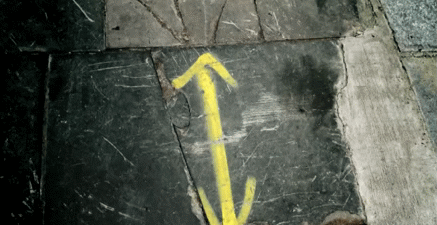
And then there’s the lovely Moffat word-play in HLV where John says “your way” when “way” also means “direction”, in a scene where John is standing at the centre axis between Sherlock and Mary like they represent his two directions/choices.
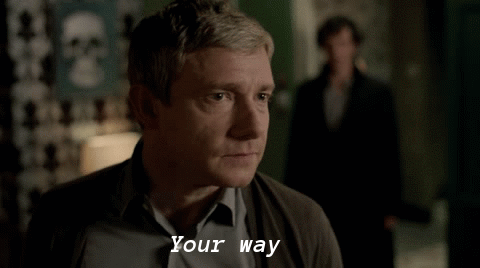
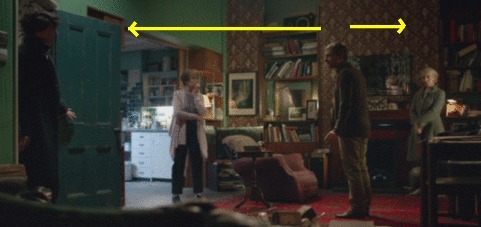
There are lots of examples of CHOICE, but two big ones are the pills in ASiP, and then Sherlock needing to choose between Mycroft and John in TFP. The theme has been noticed by many, and is always a choice between two things, two things that ultimately seem to stand in for life and death like the pills did.
“Many novels combine both [utopia and dystopia], often as a metaphor for the different directions humanity can take, depending on its choices, ending up with one of two possible futures.”
A choice was the climax of the plot of the first episode, and then it happened again very prominently in the last episode. And thanks to the predictive power of a parallel which is the basis of so much of what we do, you can absolutely guarantee that Sherlock’s choice between John and Mycroft in TFP, even though on the surface level it was about who was more useful to Sherlock, was as much about Sherlock’s own life or death as his choice of bottles in ASiP was.
Two possible futures, like a good bottle (good future) and a bad bottle (bad future). Which one comes to pass depends on your choice.
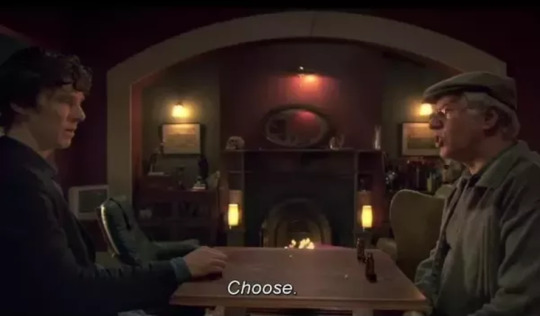
We find threads of symbolism that fit beautifully into the romance, but we fail to see beyond Sherlock and John’s story to how those two are just an example (albeit, a very important one) of a larger story of the struggle for freedom from oppression. As Sherlock said; “Make no mistake, this is war”. This is so important, because without the context of the sociopolitical allegory that’s very much there, you probably wouldn’t believe me if I suggested that “forwards or backwards” stands in for “the different directions humanity can take”

As I began yelling about a year ago, Molly’s advice after Sherlock was shot in His Last Vow is significant because:
‘Forwards or backwards’ is code for the progression versus regression of society
I hear your skeptical thoughts. Which is why I am absolutely elated to be able to share that Moffat’s little word-play metaphor in Molly’s dialogue was “confirmed”, you might say, in Moffat’s Doctor Who this year:
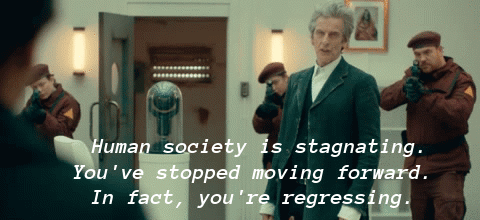
And now we’ve been given an undesirable, regressive series, after Sherlock fell backwards in His Last Vow, in a scene where an awful lot of drama seemed to surround his decision as to which way he fell, and it meant his life or death.
[Side note: In fact, the regression to a more heteronormative and homophobic false reality began immediately after Sherlock’s decision to fall backwards - Janine’s newspaper articles, John forgiving Mary at Christmas, John not understanding anything at Appledore when we know he’s pretty damn smart, John not stopping Sherlock from pulling his gun out of his coat pocket, John not doing everything in his power to save Sherlock as he flew off to his death at the Tarmac. The romance was already gone. The only decent explanation back then, was that John was faking all of that to plot against Mary. But really, John had already been replaced by his dystopian twin, the one who never loved Sherlock that way.]
Going further back to an older Moffat Doctor Who episode, Blink, we get a bit more context. I get the impression that Moffat got more subtle (or careful) in his later Doctor Who seasons, but back in Blink in 2007 he included this hilarious and very telling dialogue about his own word choice, like Captain Subtext was in the room.
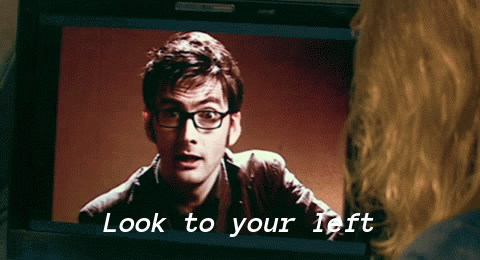


I absolutely have to put this gif of John here for you again, because note that John turns his head to his left where Sherlock is as he says “your way” (way = direction) like the Doctor’s little head movement in the gif above, and like Sally in the gif above looks up from the computer and over at Larry to her left, who (spoilers) she ends up together with at the end of the episode. It’s subtle. Infuriatingly subtle.

Direction has a political subtext. ‘Left and right’ is left-wing versus right-wing politics. The progression versus regression of society. Left and right is less subtle, which is maybe why it hasn’t been used again as blatantly as it was in the cabbie chase scene in ASiP that featured, among other things, the ‘alternative route’ being to the left...
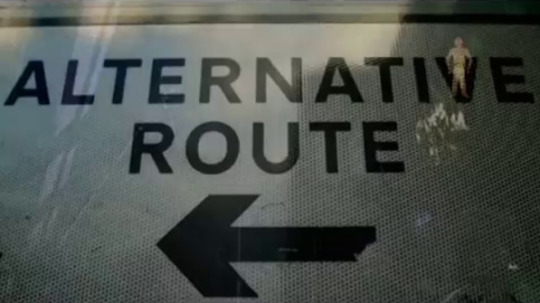
So much wordplay. ‘Alternative’ meaning another possibility or choice, and ‘alternative’ meaning departing from or challenging traditional norms.
(The signs in the cabbie chase need a whole meta, because if you go and check up on my claims here, you’ll find *no left turn* and *end of the road* which tell their own little story about S4 I think)
We do see left and right incorporated again more subtly as the show goes on. If I can borrow this great gif, we see a hint to which direction Sherlock should be going in the beautiful cinematography of the tarmac scene, where the nose of the jet looms behind Sherlock threatening to push him forwards, to the left, into John.
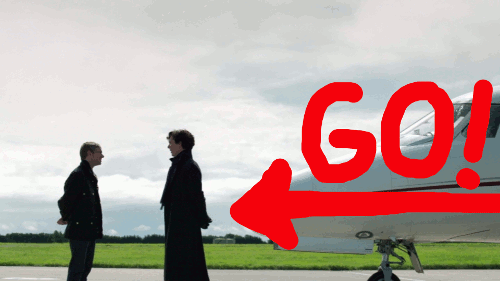
Moffat’s subtext and wordplay is used in a BARELY-THERE level of subtlety in Sherlock compared to being OFFERED UP ON A PLATTER in Doctor Who.
If I can just present a tiny example of what I mean by that before we move on...
Exhibit A:
One of the examples in Sherlock S4 of characters looking through the “fourth wall” (into the camera), likely as an acknowledgement of the audience and their part in the story. John raises his glass to the audience:
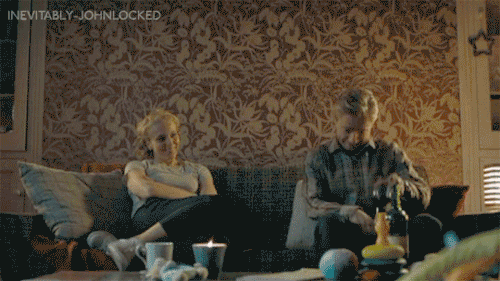
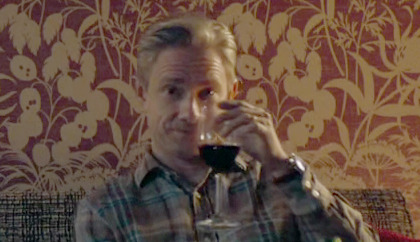
(thank you @inevitably-johnlocked)
Exhibit B:
The same thing, except in Doctor Who:
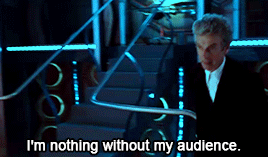
(He actually says “an audience” but thank you lovely gif maker)
That’s not behind the scenes. That’s a clip of actual show, the Doctor emphasizing a very quick deliberate glance into the camera in an otherwise normally acted scene.
You might need a moment to recover from that. I certainly did.
And then there’s the context, the rest of the dialogue from that moment (the episode is Heaven Sent):
I am falling, Clara. I'm dying. And I am going to explain to you how I survived. I can't wait to hear what I say. I'm nothing without an audience.
BBC Sherlock owes it’s success in no small part to the S2 audience that were lured in to the puzzle of how Sherlock survived the fall. So all in all, a fairly obvious Sherlock reference right there in that Doctor Who dialogue, and I think I’ve also made my point about how Doctor Who is less subtle, to say the least.
So. What is “Left or Right” in Doctor Who becomes “Forwards or Backwards” in Sherlock (more subtle, more necessary for a top secret gay conspiracy).
Moving on, let’s not forget that little Clue tagline promo for S4 that hinted at an alternate ending.

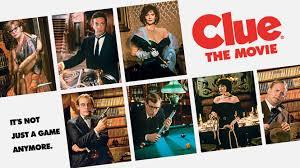
Clue (1985) featured three alternate endings and shares an almost identical tagline with Sherlock S4. We ASSUMED the alternate ending would appear around the airdate of TFP. But what if the entirety of series 5 is that alternate ending.
This is my main point, thank you for reading:
Series 5 would comprise the utopia that follows the dystopia, as a metaphor for the consequences of our choices.
Backwards for S4. Then forwards for S5.
....code named... Back 4 ??
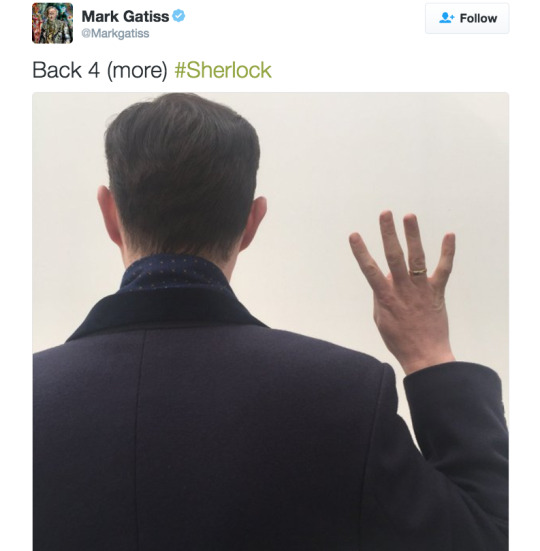
“A dystopia is an unpleasant (typically repressive) society, often propagandized as being utopian...” “.... dystopian works depict a negative view of the way the world is supposedly going in order to provide urgent propaganda for a change in direction” x
If this is indeed a dystopia, let’s break down that definition and see how well it fits series 4:
“An unpleasant, typically repressive society”
The writers’ view of “unpleasant” and “repressive” is the same as ours. In Moftiss’s dystopia, gay romance is censored and the pure wholesome friendship is reinstated. The villain who killed the gay protagonist is redeemed, glorified, and allowed to write and narrate the “ending” for Sherlock and John. Series 4 as a secret dystopia means that the meaning of series 4 will be visible once the entire 5-act story is finished.
“Often propagandized as being utopian”
We were asked to believe that S4 was real, that the outcome we were given is the joyous ending envisioned for the characters. Propagandized, by the show itself, by the writers, by the cast, as being utopian. Hence the demolishing of that fourth wall - it sure as fuck is not a game anymore. Series 4 would have us believe that it’s always been this way, and WE were reading it wrong all along.
These gifs below are from the same 2017 Doctor Who episode as I mentioned earlier, where a dystopia was propagandized as being utopia. Here, “the Monks” are the oppressive invaders who brainwashed the world into thinking they had always been there when in reality they arrived only 6 months before. Nardole dons the Captain Subtext hat and explains the themes here that people miss:
However bad a situation is, if people think that's how it's always been, they'll put up with it.
This woman is one of few who can’t be tricked though, and who fights against “the Monks”. She’s us.
As she’s being arrested, she’s told:
“You are charged with the manufacture and possession of propaganda intended to undermine the True History. This is in contravention of the Memory Crimes Act of 1975.”
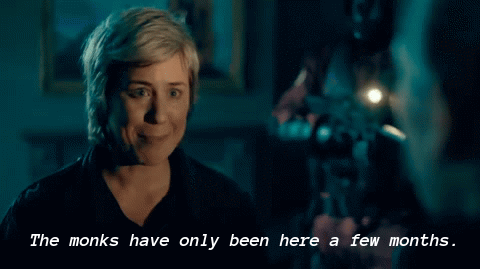
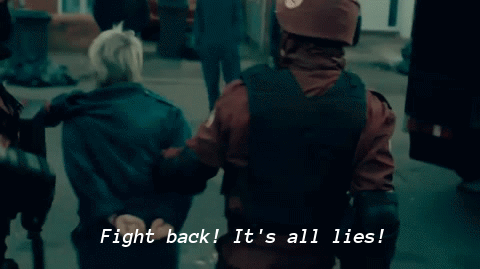
(Note the “Memory Police” reference to Nineteen Eighty-Four, the famous dystopian novel by George Orwell)
This episode needs a whole meta. Hence why I said there will be more instalments to this theory. The woman above “manufactured propaganda” to fight back against the lies. Umm. That’s....us again, I think.
“Dystopian works depict a negative view of the way the world is going to provide a sense of urgency for a change in direction”
By it’s very nature, dystopian fiction has a BIG something in common with Epic Theatre; they both aim to be a force of change.
“Many works combine elements of both utopias and dystopias. Typically, an observer from our world will journey to another place or time and see one society the author considers ideal, and another representing the worst possible outcome. The point is usually that the choices we make now may lead to a better or worse potential future world” x
Dystopia Theory fits with the mirrorverse idea; two alternate universes that are opposites. Mirror images. Utopia versus dystopia, up and down, left and right, good pill and bad pill, backwards and forwards.

The two alternate universes represent the consequences of our choices. Society’s choices, the government’s choices, yes, but also one individual and their choices. I think a large part of the subtext here, where Sherlock is the one to decide which direction we go in despite the forces working against him, is a statement about one ordinary person taking a stand, for the sake of their own liberation, as much as for society’s, and possibly winning both anyway.
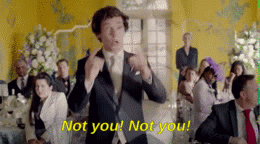

After much research (ie. watching Doctor Who), I’ve found that what this ‘choice’ subtext boils down to (at least some of the time - there are more types of choice I’ve noticed) is...
...apathy versus a fight.
In a future part I’ll go further into this idea, but for now, here is one example of where the dichotomy of ‘apathy versus fight’ can be found:
In The Lying Detective it is alluded to in the sequence of events of Sherlock’s near-death, where it appears as if he’s going to “lie down to die” in Smith’s lair (representing apathy) versus what he ends up doing, which is first swapping out the IV, then trying to fight Culverton off. Sherlock’s realization, so close to the end, that he doesn’t in fact want to die, also represents his decision that life, and what life has to offer, is worth the fight.
[The theme of apathy versus fight is seen also in the reference to Buridan’s Ass in TFP, the choice paradox (thank you @tendergingergirl). Read the meta there for the full story, but short version; the donkey does nothing (apathy), and dies.]
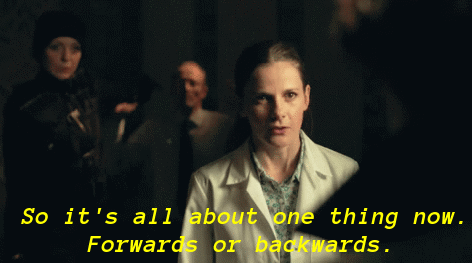
I think there is quite the weight to Molly’s dialogue here when she says “it’s all about one thing now”. In other words; the remainder of the show is all about one thing; series four (backwards), and series five (forwards).
Dystopias often feature the end of the world.
This gif below is from a different Doctor Who episode featuring another actual surface-level plot of a dystopian parallel universe:
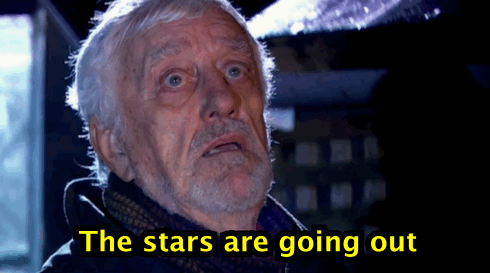
Then there was a lights-going-out theme in Sherlock series four. Keep in mind here the subtlety I pointed out earlier, less subtlety in Doctor Who, more in Sherlock.
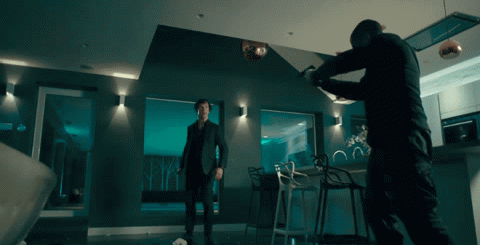
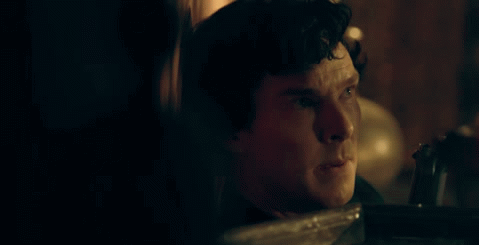
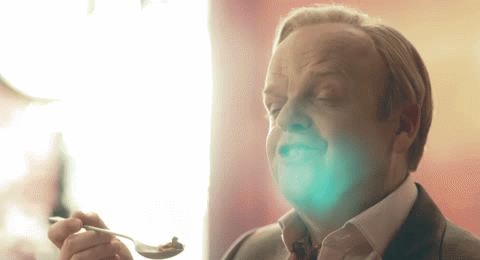
And this tweet from Mark in 2014, 6 months (!) after January 1st 2014 when TEH aired.

And speaking of Mark, he tweeted something VERY suspicious in January, days after TFP aired. At the time I KNEW this was about Sherlock, but I didn’t yet know quite how or why. He got away with it mostly because it was very clearly referring to the political end-of-the-world that was unfolding at the time. But Mark does love his double, triple, meanings.

There are some seriously geeky things to read into this one sentence, if I may:
Dystopian fiction sort of blurs with it’s cousin, the alternative history novel. Also known as a counter-factual. Where dystopian fiction warns about things that haven’t happened but might, a counter-factual is where a real historical event is altered, and the author examines how the world would have been different as a result. For example, what if Napoleon had won the Battle of Waterloo?
If we do go back to His Last Vow where the alternate universes begin as I’ve suggested in this meta, then something interesting will happen. In terms of narrative, S4 would still have been a dystopia, a future that might have happened but didn’t, an aborted time line that was snuffed out of existence. But in terms of our reality, series 4 being a part of our history that exists whether we like it or not, a retelling of His Last Vow onwards would more closely resemble a counter-factual for it’s audience in the real world. An alternative history. What could series 4 have looked like, if things had gone differently?
So I’m saying that Mark has used the term “counter-factual” here firstly to avoid using the more suspicion-inducing phrase “alternative history”, which might make our brains ping and think of the “Alternatively” at the beginning of TAB, and secondly, to play on the idea that history, time, can be rewritten (if you’re a writer), an idea heard in Doctor Who once or twice:
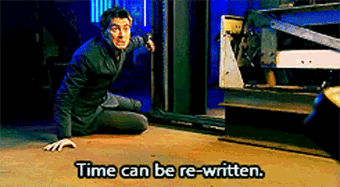



Bit of a theme, you get the gist. History can’t be rewritten in real life, but stories can. Mark’s tweet has more 4th-wall-breaking references for the pile but also a call to action. Because calling S5 a counter-factual novel reminds us that S4 exists, and can be symbolically snuffed out, but not literally.
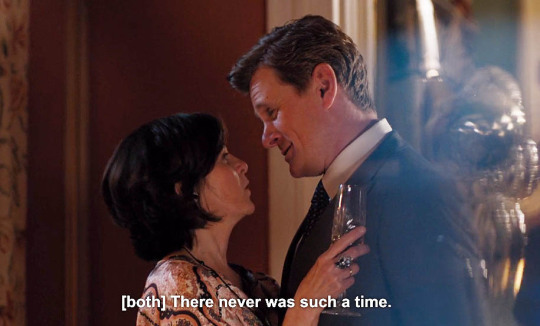
Then there’s Mark’s use of “sci-fi”in this tweet. Quite often, dystopian fiction overlaps with sci-fi, but is quite flexible and sometimes fluid in genre. Margaret Atwood called dystopian fiction a kind of “no martians science-fiction about things that might actually happen” x.
Mark could be referencing the idea that the writers are skirting a fine line between sci-fi and general fiction, with their use of parallel universes and what Sherlock is about to pull-off, which is unavoidably akin to time travel. There’s your Wholock crossover if you wanted it, which I didn’t.
And if you weren’t sure about the utopia being guaranteed to follow the dystopia, hopefully Mark’s “where everything turns out fine” will convince you. Also, if the truth in this tweet goes that far, then he was perhaps secretly assuring us that he had started writing or planning series 5 days after series four finished airing.
WHAT MIGHT HAPPEN NEXT
Because dystopias are typically set in the future, it could mean that the ‘real’ narrative is paused before the dystopia began in His Last Vow, as if time were standing still while the future simulation plays out to it’s ending.
I believe....theorize....that the very next thing we will see is a snap back to reality, “reality” being some point on the day that Sherlock was shot in HLV. At which point we will switch to the “utopian” parallel universe, which will then become purely a symbolic utopia, not a simulation. Because it will become reality, Sherlock and John’s reality. It becomes our show’s textual future, because what determines that future is their choices, and Sherlock and John are being handed the miraculous opportunity to rewrite their own lives; to go back and do it again. If you believe this theory, that is. Thanks for reading xx.
MORE TO COME
The next part will be about Time Standing Still in His Last Vow. Then there is maybe another thing or two to write. Or more. Feel free to come and poke me if I take too long, or if I’ve made a mistake here or failed to link to something or other. I’m tired. Goodnight!
570 notes
·
View notes
Text
#1 collaboration - Ash
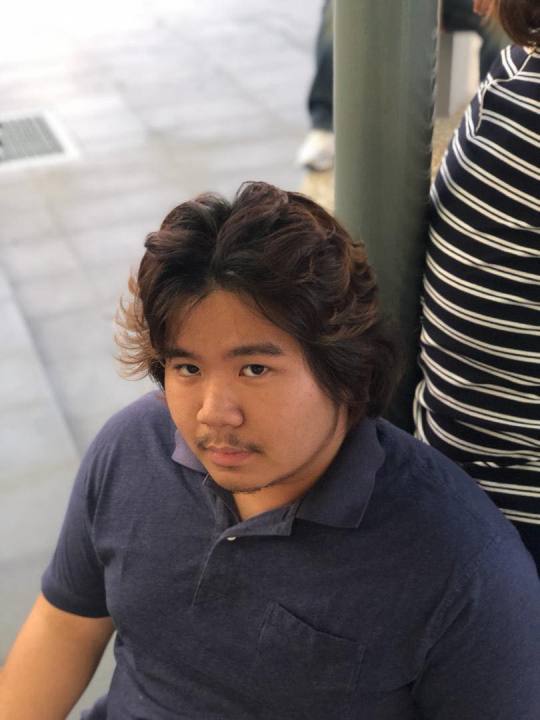
(A photo of Ash Layo)
You’re probably wondering, reading this, what’s going on.
As the first post of this kind, let me explain.
So as part of the About A City (AAC) project, I’m going to collaborate with my close friends and fellow creatives to explore the AAC’s themes. It’ll be a great way to shine a light on different perspectives, and explore poetry’s potential to illuminate things previously left unsaid or invisible.
In this first post, I have the great honour of collaborating with Ashley Layo Masing (or just Ash for short). I met Ash in my second year this year and even though we’ve known each other for a short while I feel like I’ve really got to know him through our shared background being both queer and Asian, and also our shared interests in the creative arts and social science.
The way this post is going to work (as with future posts) is that I present the two poems each written by one of us. We then lead onto comments about the poems, and then to more general discussion about the project’s themes and why poetry and the arts is so important in today’s society.
So without further ado, here goes our poems (Ash’s first):
A rainy day in London Town
It’s a rainy day in London Town,
and my lover is in the choir room
singing the harmony line to my
serenade. He holds a note for
as long as he held his breath when
a storm once forced his head under
the pressure of the river Thames -
I’m reminded of the spectres of my
trauma walking past Russel square:
a man who held the traditions of
manhood as high as his fear
passes his duty when he
abuses the way I hold my lover’s hand.
The echoes in the choir room switches from his sweet serenade to a quiet sob, and his throat becomes haunted by the legacy of some broken body.
I meditate in his sadness while I recite
an incantation from an unwritten journal.
It’s a rainy day in London Town and it
houses a refugee of tradition - I’m hiding
underneath her paper umbrella.
Comments
I first read this and thought it was really moving. What inspired you to write this piece?
As I started brainstorming ideas for this poem I started thinking about that vine with that annoying guy singing about rain in London and the TV show Glee, and boom, the first two lines were born. Then as I started writing it, I thought about my melancholic relationship to London and the hardships I faced being in what I thought was the city of my dreams. I was reminded of the horrendous act of homophobic violence that occured on a bus not too long ago as well as the instances of homophobia I personally faced and pretended to be okay with. And so this poem is a kind of ode to that part of my life, I acknowledge it but I don’t give it any power.
You use a lot of imagery about London, like Russell Square and the Thames. How important do you think that is in telling the story?
I think it’s interesting to explore human geography in poetry because it allows us to really imagine a sense of space in writing, allowing us to really breakdown (in our minds of course) the boundaries of time and space and be with the author’s experience.
I’m interested in the juxtaposition of love with violence, usually associated as its opposite. What effect did you want with that?
Sadly, that’s oftentimes the reality of love, it’s never smooth sailing. Romance isn’t what you see in movies, it’s hard work and it’s filled with adversity, especially so if you’re a sexual minority. It’s sad but it’s the truth about being in a non-heteronormative relationship, and we’re not going to be able to start any reparative work if we cannot acknowledge that.
The poem is narrated in first person and talks about (presumedly) his lover. But there’s also a sense that he’s lonely as he ‘meditates’ and ‘hides’. What do you mean by this?
I guess i’m trying to create an image of space and distance that comes with relationships. You’re not conjoined to another person when you love them, you still retain a part of yourself. It’s important to recognise the agency and personhood that still exists between people who are committed to one another
two boys, clinging
city in his eyes
pavement in his stride
he talks and burns with a little fire
something about feminist theory - I can't remember
just his anger brimming like coal
as we walk to the station at Oval
it sticks out in my head - I don't know why
how the lazy London breeze rustled leaves on the street
or it was seeing the Shard on the top deck of the bus
jutting out like a sore thumb
it felt a bit like London - nothing really belongs
people come and go like Heathrow
but as the sun goes down
and he looks at me with false hope that I won't have to -
I realise I don't want to go home
so frozen in time we remain
to memory to past to dust
two boys, clinging
Comments
So first of all, what was the main inspiration for this piece?
The piece was based off a real life personal experience I had walking with a friend in London. He’s an exchange student from Melbourne, and so I really wanted to take his perspective in the story of the poem because I wanted to see London through maybe an outsider’s eyes (being Australian/foreign). I also think the memory itself was poignant for me because I created a close friendship with him really quickly and feels a bit cut off now that he’s returned to Melbourne to study after his exchange.
You use a lot of interesting imagery, with the most significant being references to London - how key is London as a backdrop to the themes of your poem?
I could say that London is very significant as a backdrop to the themes of my poem - but that wouldn’t be completely honest, and that wouldn’t completely capture how I use geography or setting in a poem.
Personally, I don’t notice setting until something ‘dislocates’ me from it. Not to say a ‘real’ or ‘objective’ version of a setting could ever exist, but it’s interesting how our emotions help to construct the meaning of places for us through our memories, associations and who we shared them with.
So more specifically about London, I don’t think London exists, except in the imagination of people who live and study in London - in their hopes, dreams and aspirations for the future.
My experience in London has felt almost like absorption - I’ve grown up, been educated and studied in London all my life from childhood now into adulthood. But equally, my identity as a Londoner has sometimes been challenged - people can’t quite place my accent, and I definitely don’t have the same cultural tastes as people who grew up with me.
So that’s shaped how I use London in these poems in two ways: firstly, I’ve tried to understand London as a character in itself, helping to formulate desires that we didn’t know we had, like for place or belonging. But I also use London as something transitional, in process, that exists temporarily in people’s imagination but always bends towards the future, of something beyond.
And simply put, maybe it’s easier to think that all the weird, jumbled-up, tangled mess of experiences I’ve had happened in the same bubble of London. That’s one way of making sense where I’ve come from in life.
“he talks and burns with a little fire / something about feminist theory - I can't remember”
These are interesting lines that really stood out, how does this develop the subject of the poem?
I think I use philosophical or intellectual discussion to indicate tension. To me, philosophy and psychology are the same because they both ask questions about the meaning and existence of things. I prompt the reader to think about moments when they thought deeply about something - but took so much pleasure in it with someone else, that the idea took on a new life with an immanent, transcendental quality to it.
I think about moments where I’ve had deep conversations with people I really care about. Everything seems to melt away at that point, and it doesn’t matter what that other person says, you just want them to know that you’re there for them and you understand them - intrinsically, not for how clever they sound. It means that you don’t need to constantly appeal for someone’s approval or flattery, but to feel safe being who you are.
General discussion
Sean asking questions for Ash:
One theme I explore in my poems is solitude, which for me is part of the existential condition of human nature. What are your thoughts on solitude and aloneness? Is it something we need to be afraid of? Or learn to accept and overcome?
Like Agustus Waters in ‘The Fault in Our Stars’ I fear oblivion, and as much as I hated him and that book, he had a point that resonated with me. Western, capital ‘L’ Liberal, society emphasises this need to be this individual who will be this great person that will leave a lasting impact on the greater scheme of things, and that has really affected the way we relate to one another and the trajectory of our lives. Sometimes for the worse, sometimes for the better. I’ve spent so much time thinking about my individual success and the lasting impact I can make on our culture that I forget about the little things - caring about things beyond just us. Loneliness, for me, is a symptom of this perceived existential failure we might have when we think we’ve done nothing great in life and will eventually fade away into oblivion. But once we focus on the things we love and the people who love us, we can find alternative routes to overcoming loneliness.
Following on from the previous question, is the importance of friends. What conflict do you think arises from the need to be alone but the need to stay socially connected? How can that be managed?
A friend of mine once told me that everything in life is transient. Sometimes people come and go and we need to accept that. But if you care enough about a person, no matter how distant you’ve become, emotional and physically, reuniting with them will feel like no time has passed whatsoever. Sometimes it’s a matter of putting in the hard work to maintain the relationship. Other times, it’s just there.
My poems also talk a lot about desire as its core theme, related with themes of sexuality, erotic desire and love. What do you think of the importance of desire? How do you personally connect with the theme?
I think desire and passion can be sexy. Not just intimate desire, but desire in general. It shows that you care about something, and oftentimes that something is beyond your own needs. And to put someone else or something else before you, so much so that you would do anything to pursue its happiness is a trait that we should all be embracing, especially given the state of our politics.
I approach poems as a practice of remembering/forgetting - we choose to remember the memories we want to and express them openly. How do you personally use poetry?
I use it as a form of ‘emotional essay writing’, as a way to express my ideas when prose is not enough. There’s something powerful and evocative about writing in metaphor, it can really help someone understand your point of view and perspective of the world. I guess you can say that poetry carries ethnographic value.
I’m worried in today’s society we don’t express ourselves fully and openly as we ought to, and it correlates with a wider depreciation of the arts and creative writing in general. What do you think about this?
I think that due to the need to generate capital and profit, we’re becoming estranged from the things that make us human. Today, art and culture is only valuable to the extent that it can be fetishished (in the Marxist sense of course). Creating and indulging in lowbrow culture could be a potential form of praxis. But that could also fall into the trap of class-based appropriation; I mean we’re already seeing rich ppl spend ridiculous amounts of money to appear working class because it looks cool. If you wanted to look cool you would redistribute your wealth, just saying. Anyways, art and culture should be appreciated for what it is and not what it can be valued. I guess revolution might be the only way to ensure that my dude.
Ash asking questions for Sean
Starting with a basic question, what impact are you hoping to achieve with your poetry?
I want my poetry to make a connection. It could be a connection with the personal meaning in the poem. It could be a social connection, to make people think, talk and act differently.
I think it’s exciting because it’s the first time I’ve really done something like this. I think I just want to throw a pebble into the water - and watch where the ripples go.
I use my poetry as a form of ‘emotional essay writing’ so to speak; as social scientists I believe we can stand to benefit from poetry as a sort of window into our culture, do you think poetry has a stake in changing the way we discuss the pressing issues we face today?
That’s a challenging question.
Because what even is social science? I mean, is Social Anthropology really a social science? I think it is - but it’s the most humanities of the social sciences. We’re really special as a subject because we draw from literary theory and cultural theory to ask deep questions about what it means to be human from alternative perspectives.
As a result, I’m interested in the literary theory of Anthropology - of societies as texts, a la Clifford Geertz. I think the whole point of Anthropology is to understand that things can be different - and only then can you start using those differences to challenge the current status quo.
So then poetry can make a social difference. Poetry starts off for me as something very intimate and personal - I can’t lie when I write poetry, I feel like each poem is a bit of my soul, has a bit of my truth in it.
But each poem then walks along this Mobius strip of change, where meaning shifts into something different. I make sure to encourage this change myself, to make meanings outwards-bound and move towards the social exterior of the individual - I think Rilke said once that when you write constantly about sex in your poems, that’s when poetry goes to die. Because you lose what’s at stake in poetry - how often language captures a certain alterity from what’s material or tangible.
I’m going to keep pushing in my poetry for that idea of alterity, and difference, and immanence. All of those things characterise the social world for me - how the meanings we interpret from it are contingent on a sub-text which has been pre-scripted for us, but doesn’t need to completely determine how we play with them if we embrace a playful, crafty attitude.
I’m fond of the Mobius strip idea in general. If you like something, just do it. You’ll find a way to justify yourself in a narrative later. If you really want to change society all along, you’ll find a way for poetry to do that.
0 notes
Note
Top 5 scenes/ moments/ sections of dialogue from RF?
I’m gonna answer this under a cut!
1) Mulligan with Hamilton in loco parentis (I love Mulligan. I love Mulligan having his shit together more than these kids. Someday I’ll do a bonus thing of when Hamilton was staying with him. This is honestly maybe my favorite scene in the whole damn thing because I just love Mulligan so much.)
Mulligan was silent while he composed a message neutral enough to sound like it could have come from anyone and sent it. He pocketed Hamilton’s phone and let him sit quietly for the rest of the ride. He paid the driver, led the way into his building, and let them into the apartment. It sounded like one of his flatmates was in his room but otherwise they were alone. Hamilton dropped his bag on the floor and collapsed face-down on the sofa.
“I hate this,” he moaned.
“We’ll sort it out. Take off that jacket, the sleeves are too long for you. I’m gonna hem ‘em while we wait to hear back from ‘im.”
Hamilton dropped the jacket on the ground without getting up. Mulligan sighed and picked it up, taking it over to the sewing machine on the table.
“Like raising a friggin’ five year old…”
“Fuck off.”
“You gonna throw a tantrum?”
Hamilton raised one hand to flip him off.
“I can’t think, Mulligan,” Hamilton complained as the machine whirred. “Me.”
“Thanks for implyin’ the rest of us are a buncha idiots,” Mulligan said, his back to him as he worked.
“You know what I mean.”
“So you forgot your keys, big deal. Said you were sleep deprived anyway. Too much fuckin’ on vacation?”
“Just once. Wasn’t that. That didn’t help.”
Mulligan didn’t say anything, waiting patiently for Hamilton to start up again.
“Maybe I am sick,” he finally said, turning his head to the back of the couch and touching his face. “He said I felt hot. I get sick every winter anyway, fuck winter.” He struggled to take out his dry contacts. “That must be it.”
“Lovesick, maybe.” The machine stopped and Mulligan inspected his work, looking over just in time to see Hamilton reach over the armrest and drop the contacts to the carpet. “Oh, come on, I don’t spit on your floor.”
Hamilton left his arm hanging and Mulligan dropped the jacket on top of him.
“Try that when you’re done whining and tell me how it is.”
“‘Kay.”
“You done whining?”
“No.”
“I’m getting a beer. I’d offer you one, but it’s illegal to give alcohol to children.”
“You’re a jackass.”
Mulligan came back into the room, popping the tab on a can of beer. “You’re being a baby.”
“I fucking lost my work keys and I can’t get into my apartment!”
“That’s not what you’re really complaining about, Hamilton. I might not be a hotshot genius like you, but I’m not a moron. Move your legs over.” Mulligan sat heavily on the couch next to him. “You like the guy?”
“Yeah.” Hamilton’s voice was heavily muffled by the couch cushions.
“You like him a lot?”
“Yeah.”
“Things get a little too real spending that much time with him?”
Hamilton paused. “Yeah.”
Mulligan patted his leg. “Suck it up,” he said sympathetically.
2) CVS (First, this is the start of the islands/ocean theme. Second, look at these boys, this is back before they’re all over each other, that hand on the shoulder was Intimate. Someday I’ll also go through and pull things to show the progression of their sleeping habits.)
Laurens pulled him down, running his thumb over his high cheekbones and then his fingers through his hair. “You’re gonna get wrinkles,” he teased, “you’ll turn gray.”
“I’d be a silver fox,” Hamilton replied. “All the girls’ll be lining up at my door.”
“‘Girls’?”
“Yeah, I banned you after you made fun of my hair.” Hamilton rolled away from Laurens onto his back. “It’s like a sauna in the city at this time of year. I’m melting.”
“I thought you’d be used to it.”
“Trade winds.” Hamilton waved one hand dismissively in the air above his face. “And not all of this cement for the heat to just bake you in.”
Laurens propped himself up on his elbow, watching Hamilton’s face.
“I bet winter was a surprise.”
“Ha. Yeah. I stepped off that plane and—d’you know what, John? I saw autumn leaves for the first time in my life. Squirrels. CVS, for chrissake. All this shit that I had this image of in my mind because of course I knew about it, I’d seen it everywhere, and that’s the thing, isn’t it? No one in New York cares if I went to Gore’s of St. Croix, but I’ve got CVS already engrained somewhere in me and it’s beautiful, the flow of power. Soft power, John, recognize our maps and naturalize our flora and fauna and without even realizing it your center of balance is off.”
Laurens was quiet and Hamilton tucked his hands behind his head.
“You know what?”
“What?”
“You’re right, four hours isn’t enough. I don’t know what I’m talking about.”
“That’s not true.”
Hamilton closed his eyes. Laurens waited for a minute to see if he would say anything else, then lay down once he heard his breathing slow, putting one hand on his shoulder in spite of the heat.
3) Inappropriate sick flirting (Okay this isn’t like a CLASSY option or anything, but I crack myself up every time with Hamilton’s attempt to deflect-by-flirting here and I’m a sucker for sickfic, so. Shrug.)
Laurens, like Lafayette, woke before his alarm. He had gotten up late that night to take his headphones off and close his laptop, and then alternated between dozing and playing on his phone for a few hours, not willing to wake Hamilton if he was so soundly asleep. It wasn’t until he heard the second coughing fit that he got up and pulled on a pair of pants.
“Alex?” He knocked on the bathroom door. “Are you okay?”
“I’m fine.” He sounded a little strangled.
“Are you sick?”
Hamilton started coughing again. “I’m fine,” he repeated after a minute.
“Alex, come back to bed. Do you need something to drink?”
“I have water.” Laurens could hear him put the mug down on the side of the sink for emphasis. “And my laptop. I’m fine. Go back to sleep. I don’t want to keep you up.”
“I’m awake now.” Laurens tried the handle but it was locked.
“I don’t want to make you—” Hamilton cut himself off, clearing his throat and taking a drink.
“I thought you said you weren’t sick.”
“Said I was fine.”
Laurens sighed. “Look, if I’m going to get sick the damage is already done. I have to go in an hour. Just come back out. I feel weird talking to you through a door.”
There was a pause, then Hamilton opened the door and stepped out, all false-casualness in sweatpants and a pullover, taking a sip from a university mug. “Hey, J. You’re up, I’m up. What’re the odds. Wanna fuck?”
Laurens gave him an incredulous look. “No.”
4) Masculinity (Would you believe I wrote all this shit about gender before thinking critically about gender in my own life? Like, jeez, it’s one of Hamilton’s main recurring issues and the one I always identified with the most. Anyway, it was a toss up between this and the argument he has with Laurens at the end of the chapter, but it’s the same deal really.)
“What did I say wrong?” Lafayette asked. “I didn’t mean anything bad. I was teased a lot too, you know, but I’m happy for the two of you. I like being in a relationship like that. The closeness, the cuddling…”
“Yeah,” Hamilton said sharply and more directly than he meant to, “‘cause you’re not being treated like the freakin’ girl!”
Lafayette looked at him in surprise and Hamilton, embarrassed, turned away.
“Shit,” he said, walking towards the platform. “Don’t tell him I said that. I didn’t mean it like that.”
“John doesn’t think of you as a girl.”
“I know that.”
“Well, if you know that…”
Hamilton didn’t say anything.
“Do you think other people see you that way?”
“Fuck other people. How should I know what they think?”
“You would make a very bad girl,” Lafayette said.
“Shut up.”
“I don’t think anyone sees it like that except for you. John certainly doesn’t.”
“I know—look, fine,” Hamilton said, accepting that he was just going to be that annoying guy having a fight on the subway. He dug a quarter out of his pocket and tossed it into a street performer’s open guitar case to try and balance his karma out. “So he doesn’t, great. I feel bad, okay? I know he doesn’t—I like when—It’s just the way other people react sometimes. Like I’m…” Hamilton paused, gesturing helplessly as he tried to find the words. “…Less than him. Like with his friends, I liked that on the whole, it was great, I’m glad he had a good time and they were chill. But there were a couple moments where it was like they were almost making fun of me.”
“They teased me, too,” Lafayette protested.
“Bully for you.” Hamilton saw Lafayette’s hand twitch towards his pocket and he sighed. “Go ahead, write that one down. It’s dated, that’s probably why you haven’t heard it yet.”
Lafayette tucked the box under his arm then took out his notebook and copied the phrase out.
“I know it’s stupid,” Hamilton said, making an effort to lower his voice. “It shouldn’t matter. There’s nothing ‘feminine’ about it and even if there was, that’s not a bad thing. But it’s weird, okay, and I don’t like it. It’s not about being with him,” he went on after a pause in which they both waited as the train loudly pulled up. “I just hate being made to feel like less of a man for it.”
Lafayette cocked his head to the side, considering this. They got into a car and took hold of a pole near the door.
“Fucking bullshit heteronormativity,” Hamilton complained as the car pulled away, taking a step to the side for balance. “Gender doesn’t function in a void, Lafayette. In a perfect world none of this would matter and also I’d live in an apartment that didn’t leak heat during the winter.”
Neither of them said anything as the car rattled along to its next stop.
“You know what’s extra bullshit,” Hamilton started up again as the train stopped. “I fucked him today. I should be the one getting all the accolades. Instead it’s just, oh, look at the little guy, he’s so cute. Bullshit,” he muttered again, tugging his scarf down. “Doesn’t always bother me,” he added. “I dunno, I know you didn’t mean anything by it. Wasn’t even the tone. I don’t know.”
“I think you’re very masculine.”
“Thanks.” Hamilton still sounded sullen.
5) Out (Is it weird to say that I consider this part “a classic”? This is the thing that got me by far the most amount of comments and, I mean, Laurens earned it.)
“God damn,” Humphreys complained, freshly dressed and sitting next to Laurens on the bench between the rows of lockers and working at a knot in his neck. He tipped his head to the side so that fine braids slid like a curtain over his hand. “Don’t get me wrong, Laurens, I don’t want to blow my shoulder out, but you don’t even know how much shit I would have gotten into if I had gotten a month and a half off.”
“Dirty shit,” Tench laughed. “Go back to your farm, find some of those sheep?”
“Shut up,” Humphreys said, laughing as well. “That was a business plan.”
“Yeah, the oldest business in the world. Sam, catch.” Another player walking by caught his wallet without missing a beat. “I owe you ten.” The money was taken and the wallet was tossed back. Tench dropped it in his bag.
“Anyway, like I was saying, it’s not that I envy you, just those extra six weeks.”
“I hear you,” Tallmadge agreed, coming back from the shower in just a towel. “It’s hard to visit my girlfriend during the week. It takes so long to drive down, it’s really only possible on the weekend, but then, okay, so we can’t fool around as much as I’d like. Not that I’m actually ready for the monastery like our boy Laurens,” he teased, shoving Laurens playfully as he opened his locker. “How’re you holding up? I’d have assumed you just weren’t interested if I hadn’t had to listen to you for all these years.”
“Sainthood’s a real lonely road,” Tench added.
“Hey, come on,” Laurens protested, not really thinking about what he was saying, “My boyfriend’s all over me too, I know what it’s like.”
There was actually a moment of stunned silence in the locker room during which time Laurens braced for—
“You aren’t single? Hey, look, it only took five years! That means there’s still hope for you yet,” Tallmadge said loudly, slapping a passing first year, the younger of the two Trumbull brothers, hard on the back. “If you bitch about not getting a date one more time, I’m not stopping your older brother from whaling on you.”
Laurens watched in relieved surprise as various conversations picked back up around him.
“That explains why you haven’t gotten any personal fouls so far this season,” Tench teased him.
“So can we know who it is yet? Or is it still a secret?” Tallmadge dropped his towel to change, facing his locker. “I want to know who tamed the stallion.”
“‘The stallion’?” Humphreys was packing his bag. “Oh, come on, and I’m stuck with the sheep?”
“You wrote that paper, you brought this upon yourself,” McHenry said, breaking away from his earlier conversation and pushing up his glasses. “So who’s the lucky gent? I’m with Tallmadge, he deserves a Goddamn medal for finally wearing you down.”
“Alex,” Laurens started, caught between embarrassed and incredibly grateful. “Alexander Hamilton.”
“Hamilton… The guy with you at the trustee dinner? Short,” Tench said, gesturing his height. “Wavy hair? We went to André’s after.”
“That guy?” McHenry cut in. He tugged at the collar to his shirt and glanced down at himself, feeling the tag sticking out in the front. “Shit.” His voice was muffled for a second as he pulled it off over his head, flashing well-defined abs and two faint scars curving under his chest, then put it back on. “He works for the dean, doesn’t he?”
“Secretary to the president,” Laurens said, tentatively bragging a little.
“I thought he was with your roommate?”
“André’s his friend, he said that was just a rumor.”
“Obviously,” Tench rolled his eyes at Tallmadge. “Know-it-all.”
“Hey, André,” Humphreys called as André, also in a towel and with his hair wet and down in his eyes, showed up. “Did you know Laurens’ been holding out on us?”
“Uh.” André looked quickly at Laurens, who stood up.
“All right, all right, that’s enough.”
“So how is it?” Tench asked, ignoring Laurens’ protests. “Does he just want it all the time?”
“What?”
“You said he was all over you,” Tench pushed. “Did you have to give up your rule?”
Laurens reddened slightly. “No.”
“What? So, nothing? Not at all?”
“All season?” Tallmadge asked. “I take it back, he’s the saint, not you.”
“Wait, you did fuck though, didn’t you? You were together at the dinner, right?”
Laurens, still standing, not sure what was really stopping him from just walking away, felt an excited rush of camaraderie. “Yeah, we were, and we did. The night before,” he added before he managed to second guess himself and lose his nerve, “I fucked him so good he cried.”
Another shocked silence, then a delighted whoop of laughter.
“That’s our boy!” Tallmadge pounded Laurens on the back as he grinned, simultaneously self-conscious and proud.
“Damn,” Humphreys shook his head. “And here I thought we were going to need to give you a talk about the birds and the bees before you graduated and got sent out into the real world.”
“Maybe we still do,” Tench said. “Laurens, let me make this brief: you’re a moron.”
Laurens frowned, unsure. “What?”
“You said it yourself, he’s all over you. Go take advantage of that opportunity, man! You’ve waited long enough.”
“I had sex in high school,” Laurens protested weakly.
“Yeah, you know, you told some of us that story,” McHenry pointed out, “and while it sounded like a real great time, half a decade has passed in between.”
“He’s pretty cute,” Tallmadge agreed as Laurens stared at him in disbelief. “Long eyelashes.”
“Since… Since when do you check out other guys?”
“Relax, please, I sat next to him in lecture once. I remember because they friggin’ cast shadows on his face.”
“Uh-huh,” Laurens said, not sure at all about what to do with that.
“You do want to sleep with him, don’t you?” McHenry asked. “This isn’t another basil farm incident, is it?”
Laurens looked over at André, who studied the ceiling.
“No, uh,” Laurens said eloquently. “The sex is—it’s good. I enjoy it.”
“Then go fuck your boyfriend,” Tench told him, a little louder than Laurens would have preferred. “Seriously, Laurens! Did you hit your head when you ripped your shoulder out of its socket? He wants to, you want to, that grand tradition you thought you were holding to is a bunch of bullshit—no one actually does it. If you’re so concerned about your stamina then don’t sleep with him the night before the game! Jesus!”
“His girlfriend’s on study abroad,” André reminded Laurens, nodding his head at Tench.
“Right.”
“Lucky son of a bitch,” Tench muttered, zipping up his bag forcefully and slinging it over his shoulders as he stood. “Right, I’m starving. You getting breakfast, Laurens?”
Laurens smiled. “Sure. Sounds good.”
28 notes
·
View notes